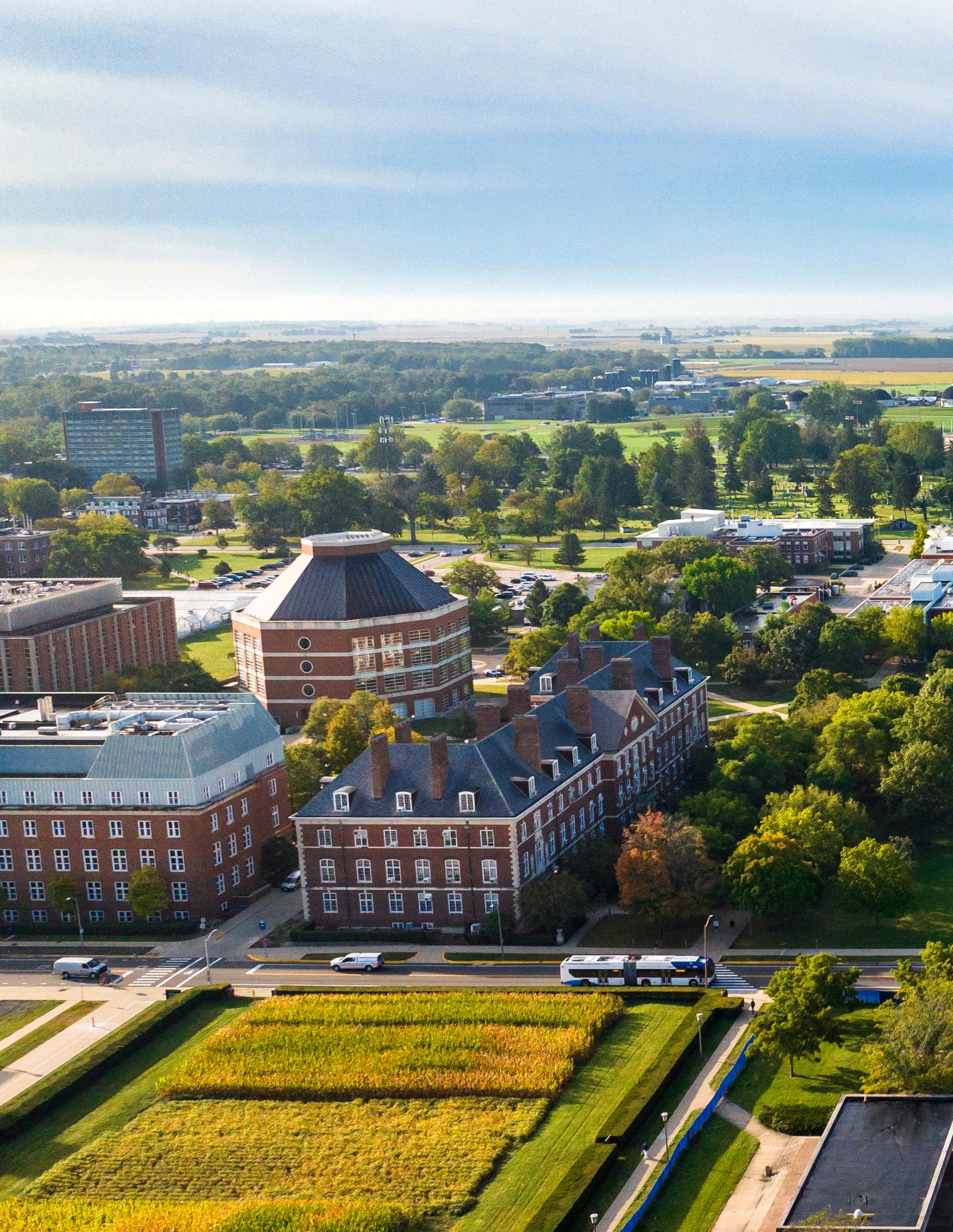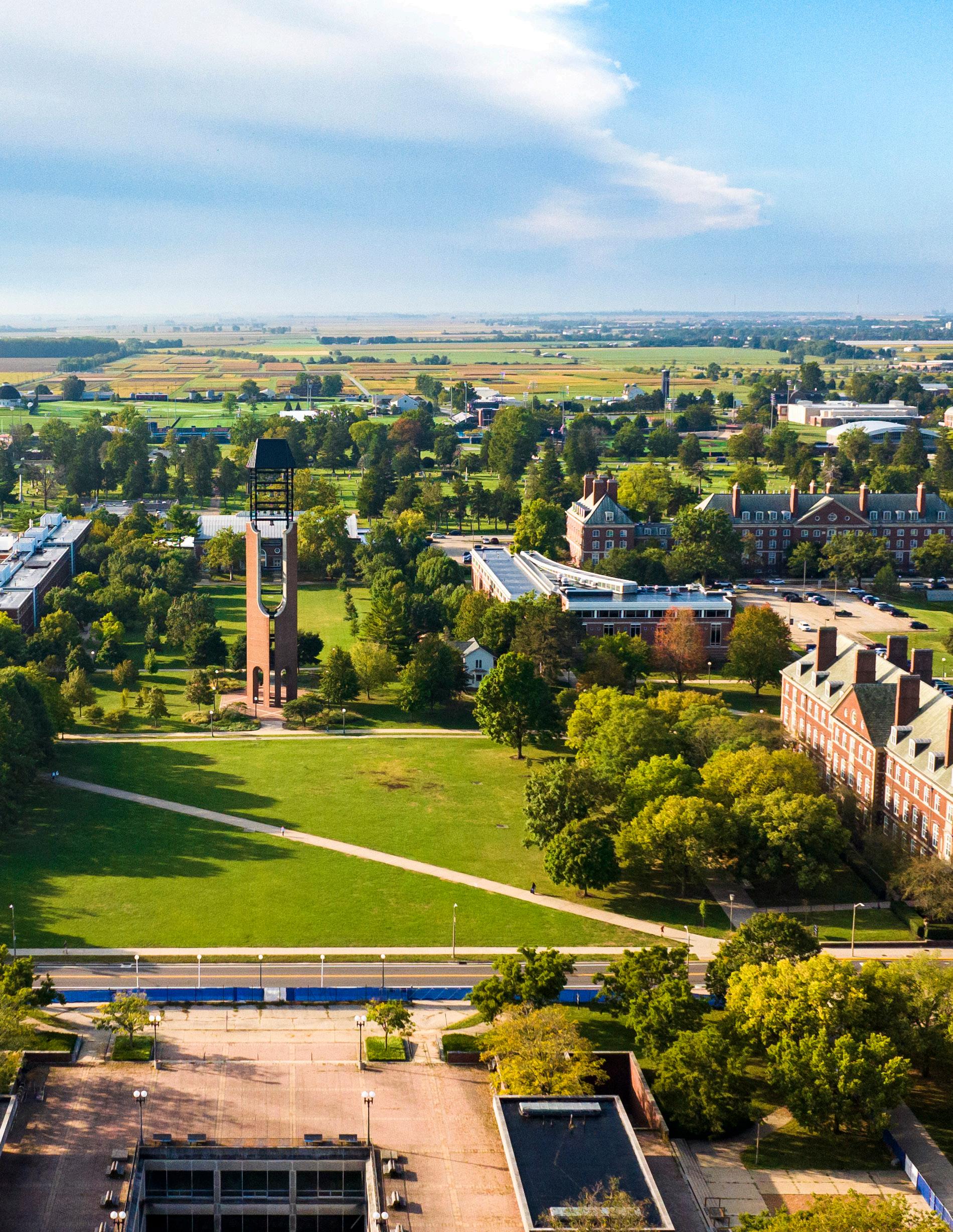
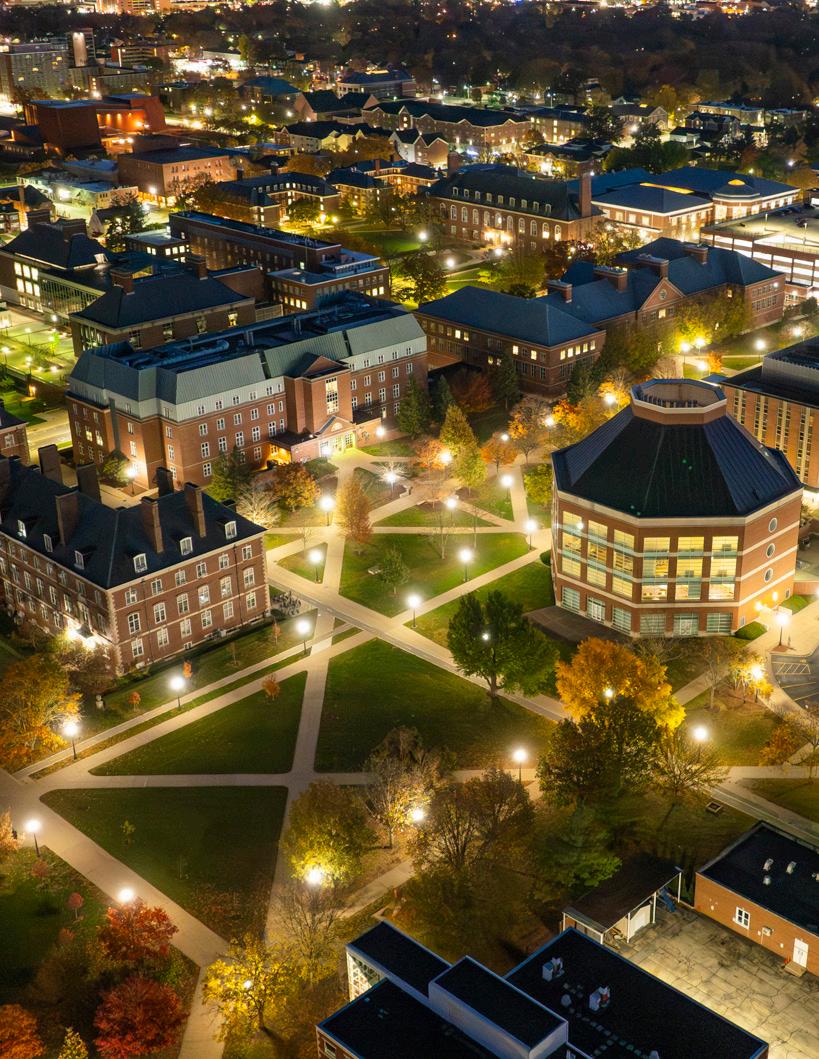



4 Letter from the Dean
6 Our Enduring Land-Grant Mission
8 Communities Thrive with Extension Support
10 Rooted in Belonging
12 Fast Track to Food Animal Veterinary Careers
13 Planting Seeds of Global Citizenship
14 Emergency Gift Revives Soybean Innovation Lab
16 ACES Online Opens Doors for Adult Learners
18 Doubling the Impact
19 H5N1 Hits Home, ACES Experts Address Concerns
20 ACES Student Elected FFA President
21 A Champion Effort in Community Impact
22 Promoting Healthy Families & Communities
24 Building Inclusive Solutions to Complex Problems
25 Teaming up with Industry for Food Innovation
26 From the Barn to Medical Breakthroughs
28 Saving Soybeans
30 ACES Leads Tech Solutions for Ag Challenges
32 Large-Scale, Real-World Data Improve Farm Management Practices
33 Empowering Namibian Women Farmers
34 ACES Student Studies Nature’s Most Misunderstood Creatures
36 The Business of Bees
38 Illinois Launches Nation’s First Center for a Climate-Smart Circular Bioeconomy
40 The Future of Food is Personal
42 The Green Industrial Revolution Starts Here
44 Full Circle Impact
45 ACES Alumna Finds Sweet Spot in Cookie Biz
46 Planting Seeds of Success
48 A Global Voice for Agriculture
49 New Extension Facility Embodies Collaborative Impact
50 Where the Next 150 Years Begin

“ For over 150 years, ACES has answered society’s needs with research-backed solutions that strengthen our communities, safeguard our resources, and improve lives in Illinois and around the world. ”

Imagine a world without the College of Agricultural, Consumer and Environmental Sciences. No Illinois Extension connecting vital knowledge to every corner of our state. No 4-H nurturing the next generation of leaders. No pioneering breakthroughs in food systems and policy, human and animal nutrition, agricultural innovation, child development and family relationships, sustainable ecosystems, or environmental conservation.
Without ACES, the past and our future would look very different.
At a time when uncertainties, including threats to federal research funding, challenge institutions like ours, it is more important than ever to recognize what’s at stake. For over 150 years, ACES has answered society’s needs with research-backed solutions that strengthen our communities,
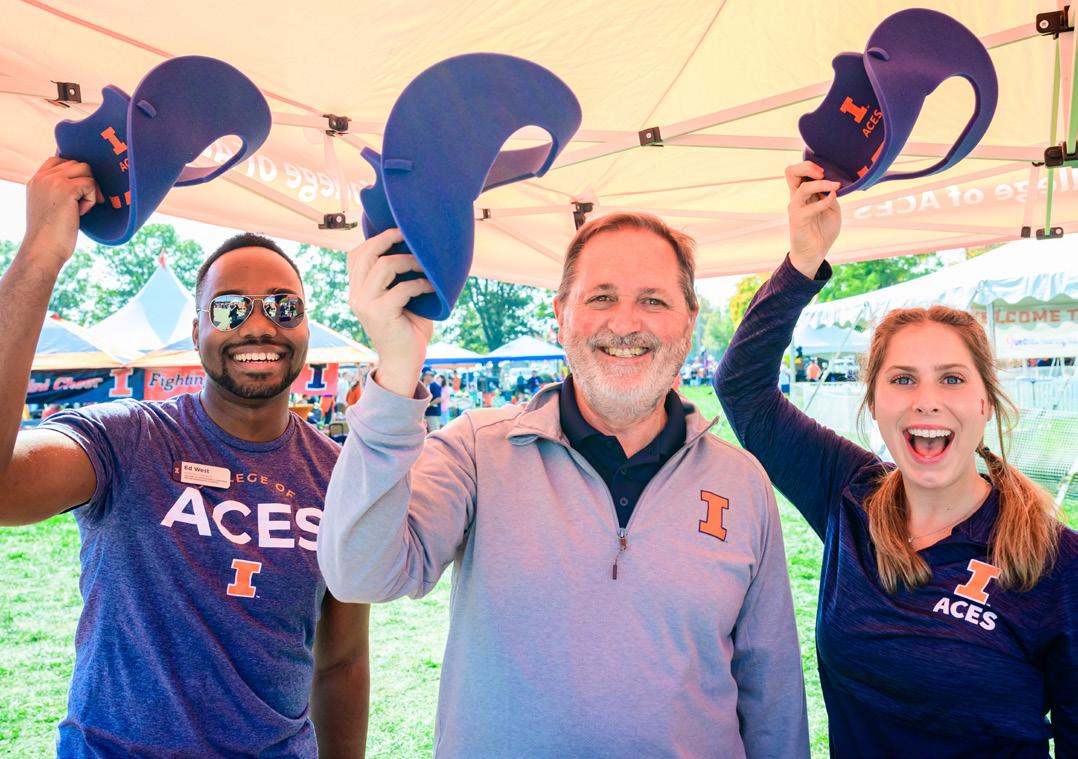

safeguard our resources, and improve lives in Illinois and around the world.
Today, that legacy is alive and thriving. Our faculty, staff, and students continue to innovate across disciplines: advancing food security, restoring ecosystems, strengthening families and communities, unlocking new technologies in human health and nutrition, and forging new frontiers in sustainable agriculture and biomanufacturing. Through Illinois Extension, we ensure that the discoveries made here ripple outward to build a stronger, more resilient future for all.
In these pages, you will see the world we are helping shape one built on curiosity, community, innovation, and momentum. The challenges before us are real, but so is the promise we hold. Guided by our land-grant mission, ACES remains steadfast: creating knowledge, expanding opportunity, and building a better tomorrow.
Thank you for being part of our story and our future.
With gratitude and hope,
Germán Bollero Professor and Dean Robert A. Easter Chair
The land-grant university system was born in crisis during the Civil War, amid economic uncertainty and punishing drought. Yet even in that moment of national upheaval, President Abraham Lincoln saw a way forward: invest in education that serves the public good.
With the Morrill Act of 1862, Lincoln launched a revolutionary idea that higher education should be accessible, practical, and built for the people who feed, build, and sustain our country.
That act laid the foundation for the University of Illinois Urbana-Champaign, where the College of ACES would
the Hatch Act of 1887 and the Smith-Lever Act of 1914 expanded that vision into research and outreach, forming a three-part mission that ACES continues to fulfill today: teaching, discovery, and public engagement.
And in a world facing climate disruption, political polarization, and widening gaps in trust and access that mission has never been more relevant.
At ACES, the land-grant mission still opens doors to opportunity, to knowledge, to a better life. Today, our

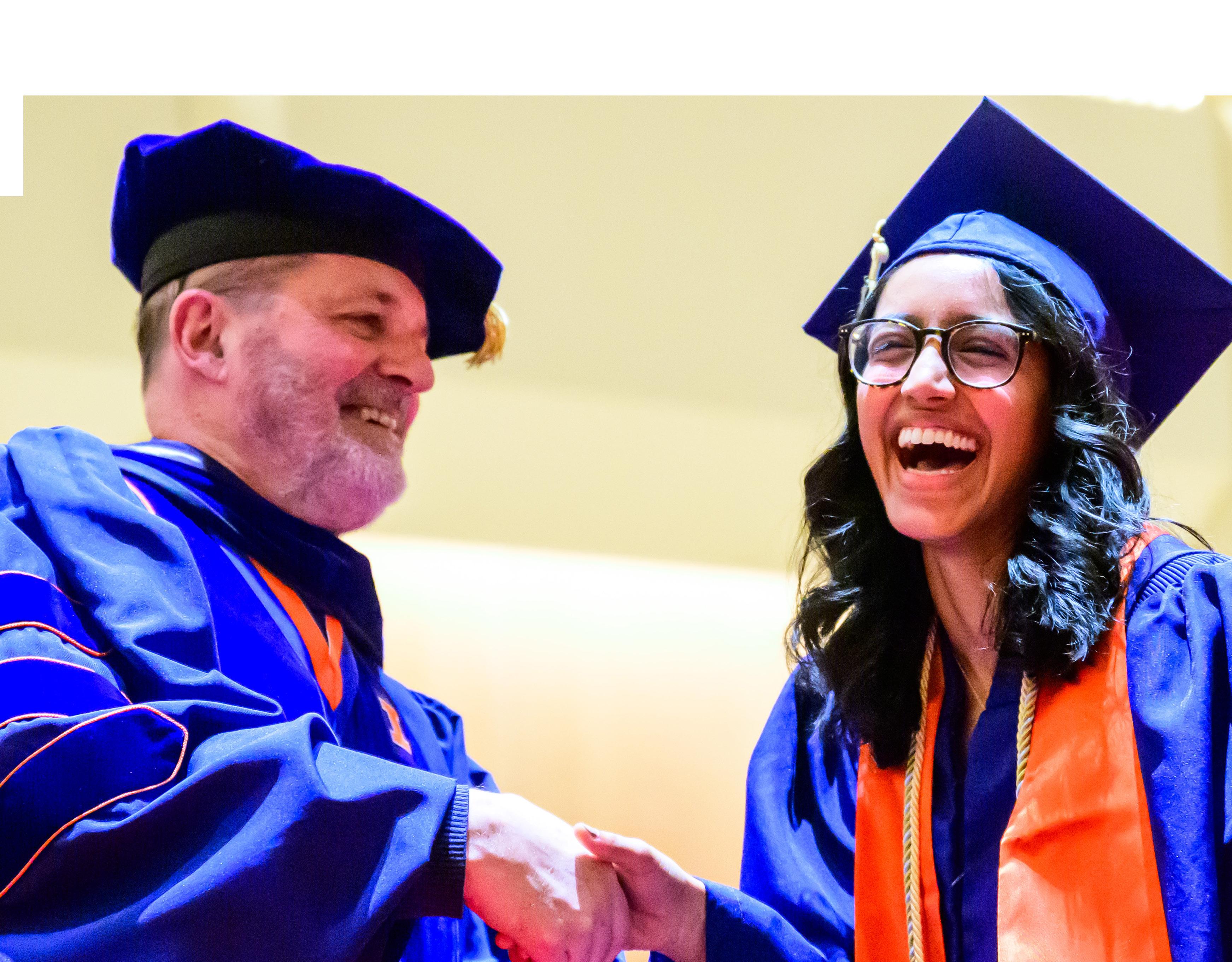
as around the country and the globe bringing with them diverse experiences, ambitions, and dreams. Many are the first in their families to attend college. Others are following generations of alumni who have trusted ACES to prepare them for lives of impact.
What unites us is a commitment to learning that leads to action. Across disciplines from food systems to mental health, from nutrition to environmental science ACES students are immersed in solving real-world problems from day one.
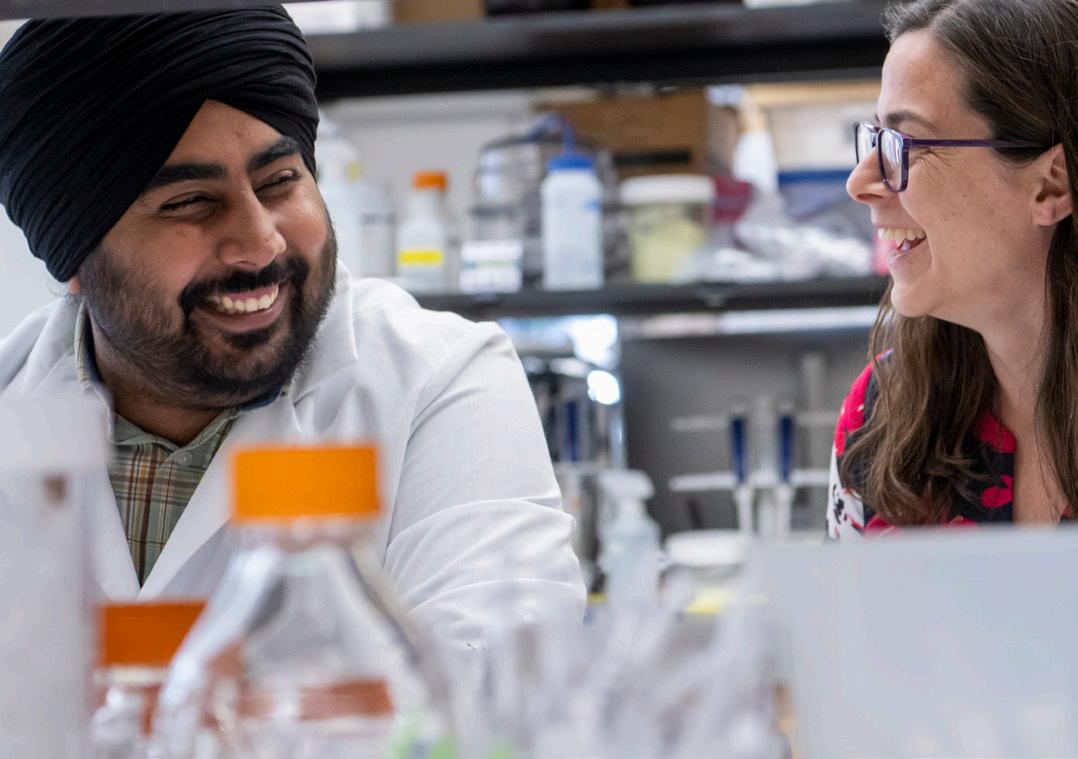
“We don’t just open doors we help students walk through them with purpose,” said Anna Ball, associate dean for academic programs. “That’s the power of a land-grant education. We’re transforming everyday those who might not have envisioned here, into the leaders our world needs and driven by purpose who go out communities.”
Our graduates are shaping public policy, equity, leading sustainable farms, and food systems for the future. And they Illinois, but around the globe.
The land-grant model isn’t about research sake it’s about discovery that improves faculty lead projects that address the and anticipate the demands of tomorrow: climate adaptation, water quality, ag conservation, and rural development.
“Our faculty are doing cutting-edge work we are solving real problems: helping farmers boost production efficiency, improving nutrition and health outcomes, supporting families. That practical focus is what sets our research apart,” said Rod Johnson, associate dean for research.
That connection between science and society, between education and opportunity is critical. Especially now.
Trust in public institutions is fragile. The gaps between urban and rural, wealthy and underserved, continue to grow. Land-grant universities were built to close those gaps. That mission has never been more urgent or more worth protecting.
“Being a land-grant institution isn’t something we take for granted,” said Dean Germán Bollero. “It’s a tremendous responsibility that we try to live up to, every day. And that means staying rooted in service to students, to communities, to the state of Illinois, and to the world.”
Sustaining this mission and all the good it brings requires continued investment from state and federal granting agencies, corporate partner organizations, and individuals who believe that public research and education are worth fighting for.
The land-grant mission is more than a historical mandate it’s a living covenant between the university and the people
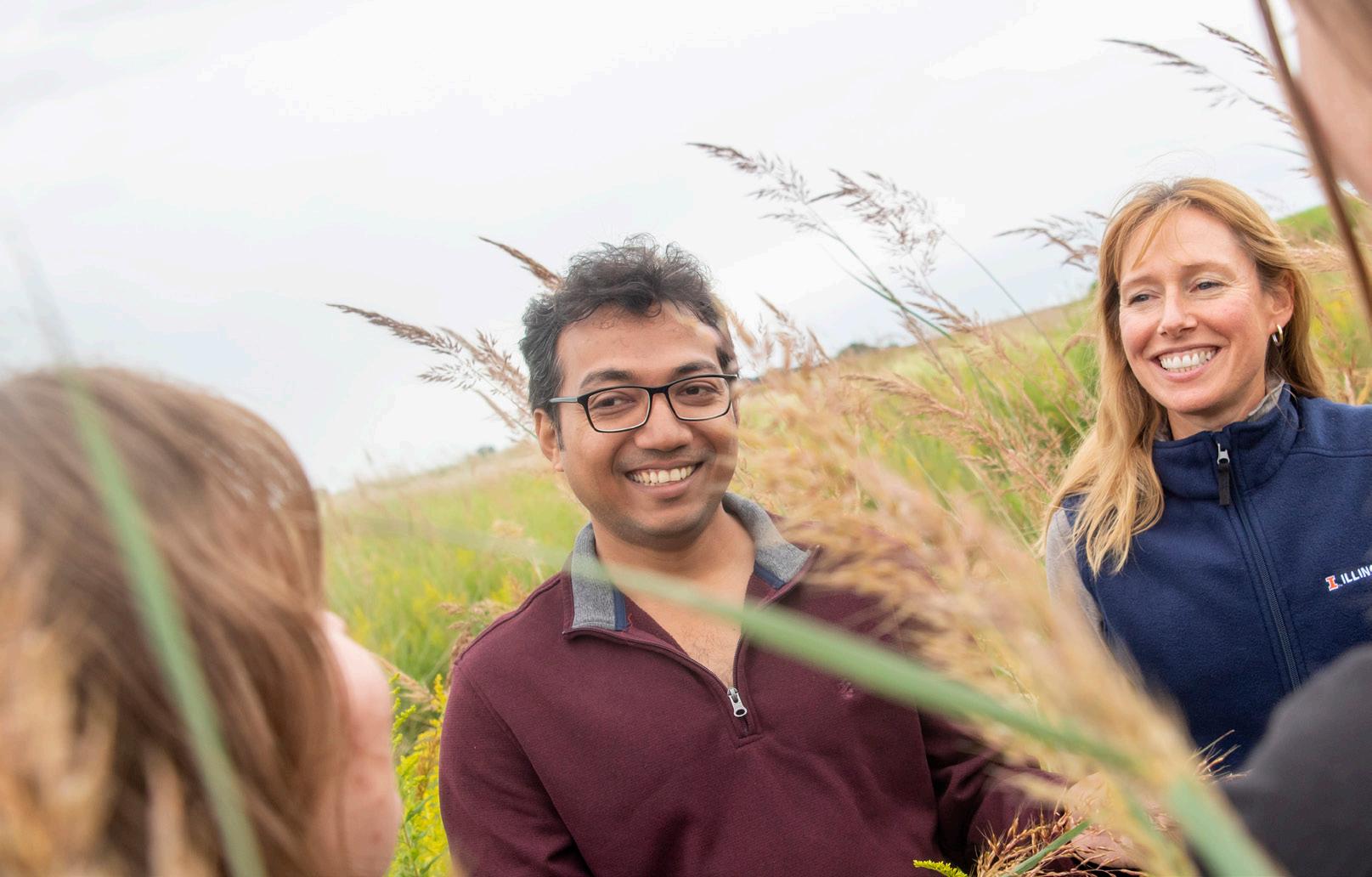
At a co-op grocery store in Cairo, teaching shoppers to make healthier food choices. At a McLean County field day, discussing effective weed management with farmers. In downtown Chicago, guiding teens through a 4-H robotics challenge. In a community garden in Monticello, growing fresh produce for local pantries. At the Monmouth Library, helping young children practice mindfulness. At the Stephensen County Farm Bureau, leading a workshop on food safety management.
In every part of the state, in every season, Illinois Extension, including 4-H, is there listening, teaching, planting, building, and leading.
At its core, the land-grant mission is about service turning university research and expertise into practical solutions that improve lives. Nowhere is that mission more visible than through Illinois Extension, the statewide outreach arm of the University of Illinois and the College of ACES.
“Established by the Smith-Lever Act of 1914, Extension was created to bring the knowledge of land-grant universities directly to the people,” said Interim Associate Dean and Director of Illinois Extension Durriyyah Kemp. “Extension
brings research to life in ways that are local, relevant, and impactful.”
Extension serves all 102 counties through a network of 27 local units and hundreds of educators and volunteers. From urban neighborhoods to rural communities, Extension delivers research-based programs in agriculture, climate resilience, health and wellness, financial education, and more and youth development through one of Extension’s most visible and beloved programs: 4-H, the state’s largest youth development organization.
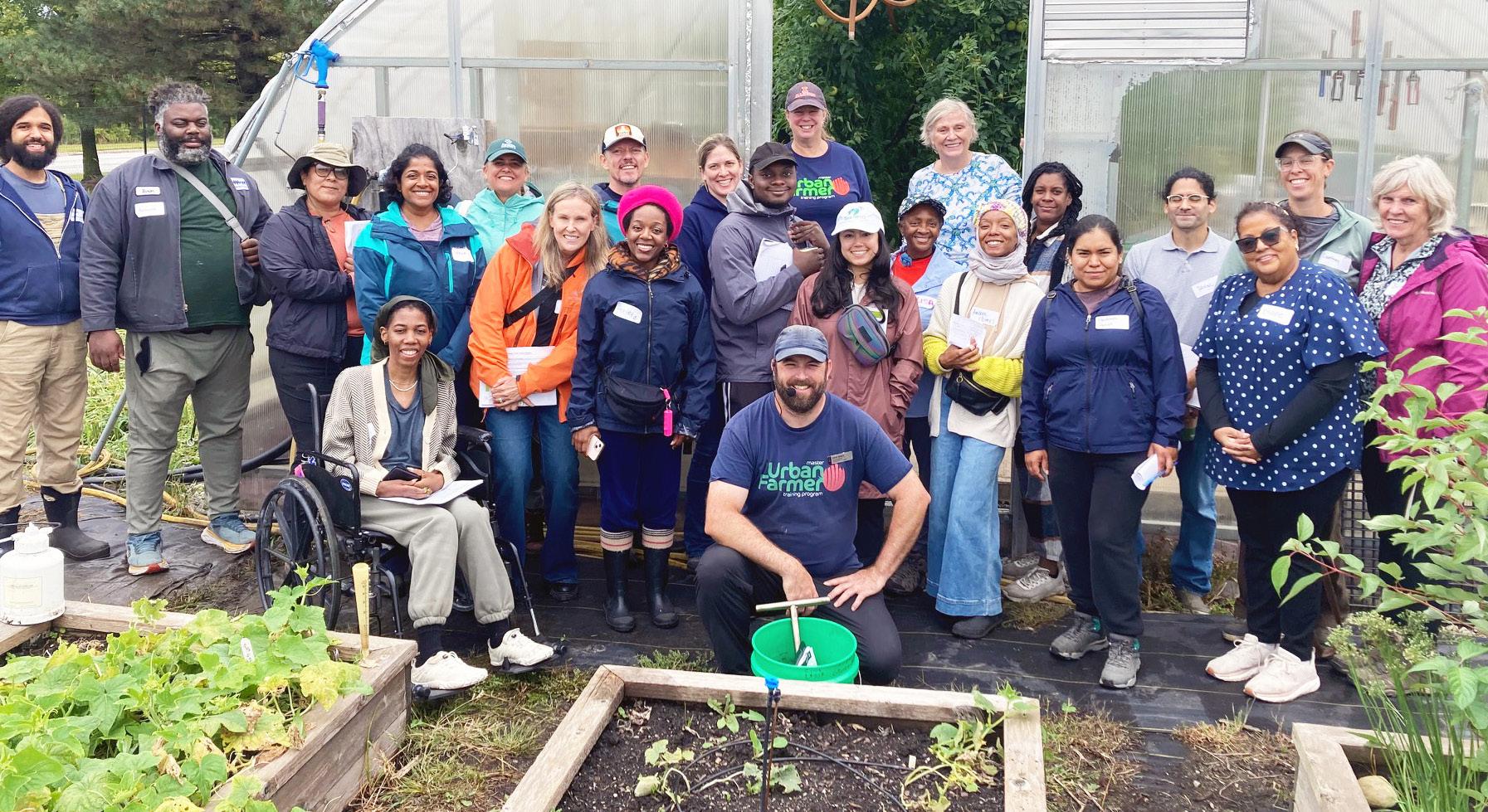
Staff & volunteers promote hands-on learning through master gardener-led training.
Grounded in the four “Hs” Head, Heart, Hands, and Health 4-H provides more than 260,000 youth experiences each year through clubs, camps, leadership programs, and service-learning projects. Participants explore everything from robotics and environmental science to civic engagement and animal care building skills that prepare them for life.
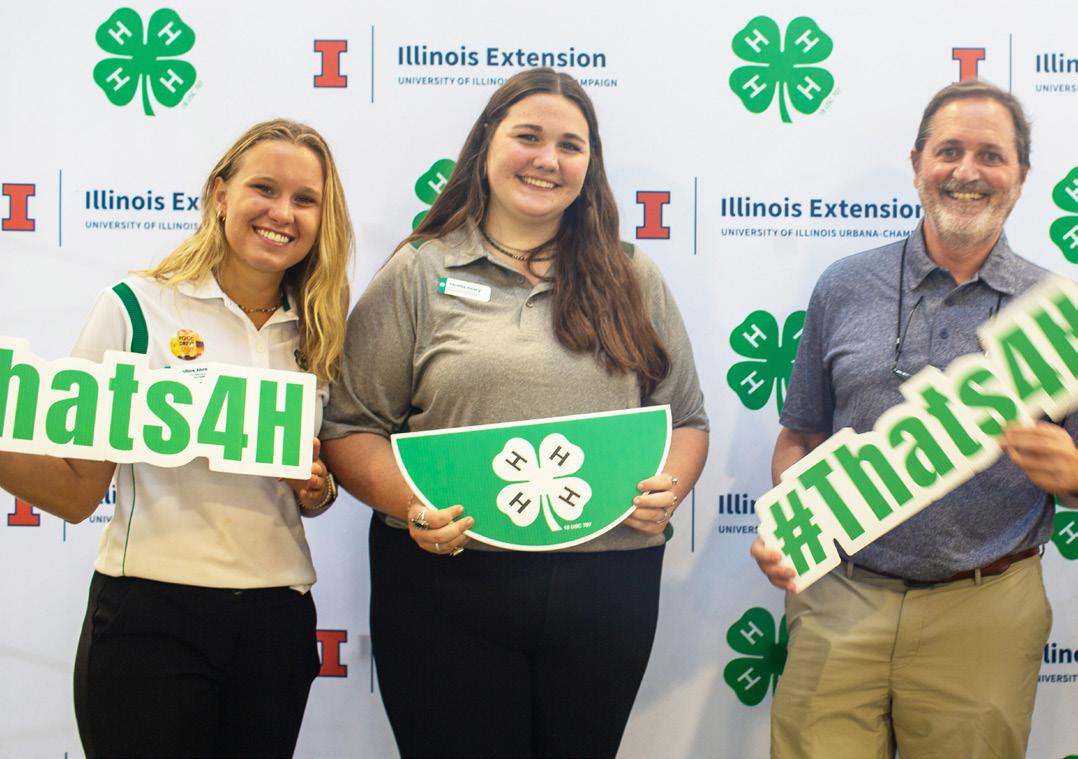
“4-H is focused on equipping our youth with the skills and experiences they need to succeed in life and give back to their communities. We want to help our youth continue to be ‘Beyond Ready’ and assist in their development to be ready for work and for life,” said Kevin Carey, interim assistant dean and program leader for Illinois 4-H.
To meet the complex challenges facing Illinois communities today and in the years ahead, Illinois Extension has launched a new strategic plan designed to guide the organization’s work and sharpen its statewide focus. This plan lays out a clear roadmap for the future, helping Extension align its efforts, strengthen partnerships, and expand its impact across the state. It provides a shared framework for setting priorities, measuring outcomes, and ensuring accountability.
At the heart of the strategic plan are eight priority areas that reflect Extension’s responsive, community-centered vision for public service:
• Community
• Economy
• Environment
• Food and Agriculture
• Health
• Partnerships
• Technology and Discovery
• Workplace Excellence
These priorities help Extension channel its deep expertise into the areas of greatest need, building on its longstanding strengths.
Extension volunteers including those from 4-H and other program areas contribute service valued at more than $15 million annually, helping strengthen communities across Illinois. Just last year, Master Gardeners donated over $500,000 in fresh produce to food pantries statewide, supporting food security and nutrition for local families.
But this work isn’t possible without meaningful, ongoing investment. Through House Bill 4587, ACES and University of Illinois leaders are working in partnership with state legislators to secure increased funding for Illinois Extension. This legislation supports the capacity needed to maintain trusted local programming and respond to emerging needs, from disaster preparedness to mental health outreach to STEM education for youth.
Throughout the state, Illinois Extension shows what public service looks like when research, education, and real-world impact come together. They are the land-grant mission in action and a shared investment in the future of our state.
To support the vital work of Illinois Extension, including 4-H, in communities across the state, visit extension.illinois.edu/giftpage.
Follow the instructions to make your gift. Your support helps bring practical education and research-based solutions to where they’re needed most.
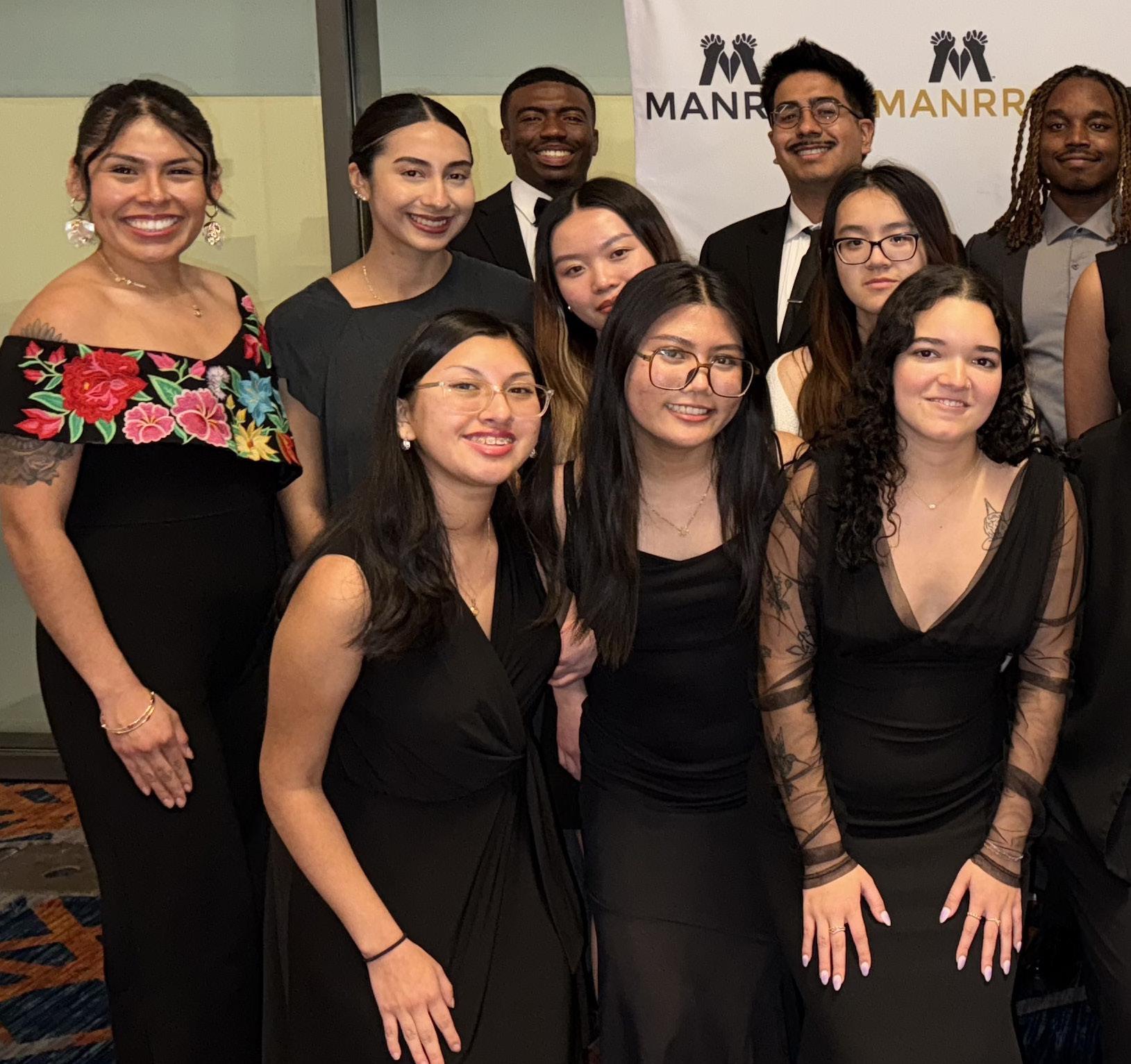
Chicagoan Ashley Equíhua didn’t plan to apply to universities outside of her home city, but an early exposure to ACES’ culture changed her mind.
“My junior year of high school, I found a summer research apprenticeship program through ACES,” she said. “It was a great experience that introduced us to all the ACES majors and the opportunities that exist on campus.”
More importantly, it was a point of connection with Diana Rodríguez, assistant director of inclusive recruitment and retention at ACES. Rodríguez assured Equíhua that if she came to Illinois, there was a space where she would feel seen, supported, and celebrated.
That space was MANRRS Minorities in Agriculture, Natural Resources, and Related Sciences a national organization that supports the academic and professional success of students of all racial and ethnic groups. The Illinois chapter advised by ACES staff has become a cornerstone of career preparation, leadership development, and, perhaps most importantly, community.
Equíhua enrolled as a nutrition and health major in the Department of Food Science and Human Nutrition and joined MANRRS immediately. It felt like family. “MANRRS is
really unique,” she said. “It empowers our community and gives us professional development opportunities.”
In 2024, Equíhua won a national contest to choose the theme of the 2025 national MANRRS conference. Her theme, “I Am, Because You Are,” is a translation of the Zulu word “ubuntu,” which Equíhua learned about on an ACES Study Abroad experience in South Africa.
“‘I Am, Because You Are’ reminds us that none of us arrive here alone we succeed because others chose to invest in us and in the College of ACES. Our students thrive today because others believed in them yesterday,” said Elizabeth Olson, assistant dean for diversity, equity, and inclusion in ACES. “Every student’s journey is made possible by a network of support.”
For Equíhua, this means not just honoring those who forged the path for her, but also being a part of that support network for others. She soon became the Junior MANRRS Chair, recruiting high school students like herself to learn more about programs at Illinois and helping students from all backgrounds feel like they belong.
Supporting the IL MANRRS chapter is just one example of ACES’ commitment to creating a sense of inclusion for everyone in the college. Broadly, this culture is reinforced by the Office of Diversity, Equity, and Inclusion, which develops

policies, programs, supports, and resources to ensure that every student and employee has the opportunity to succeed.
“DEI isn’t something we do on the side,” Olson said, “It’s the foundation we stand on in ACES. We’re creating a future where everyone feels safe, empowered, and valued, ensuring
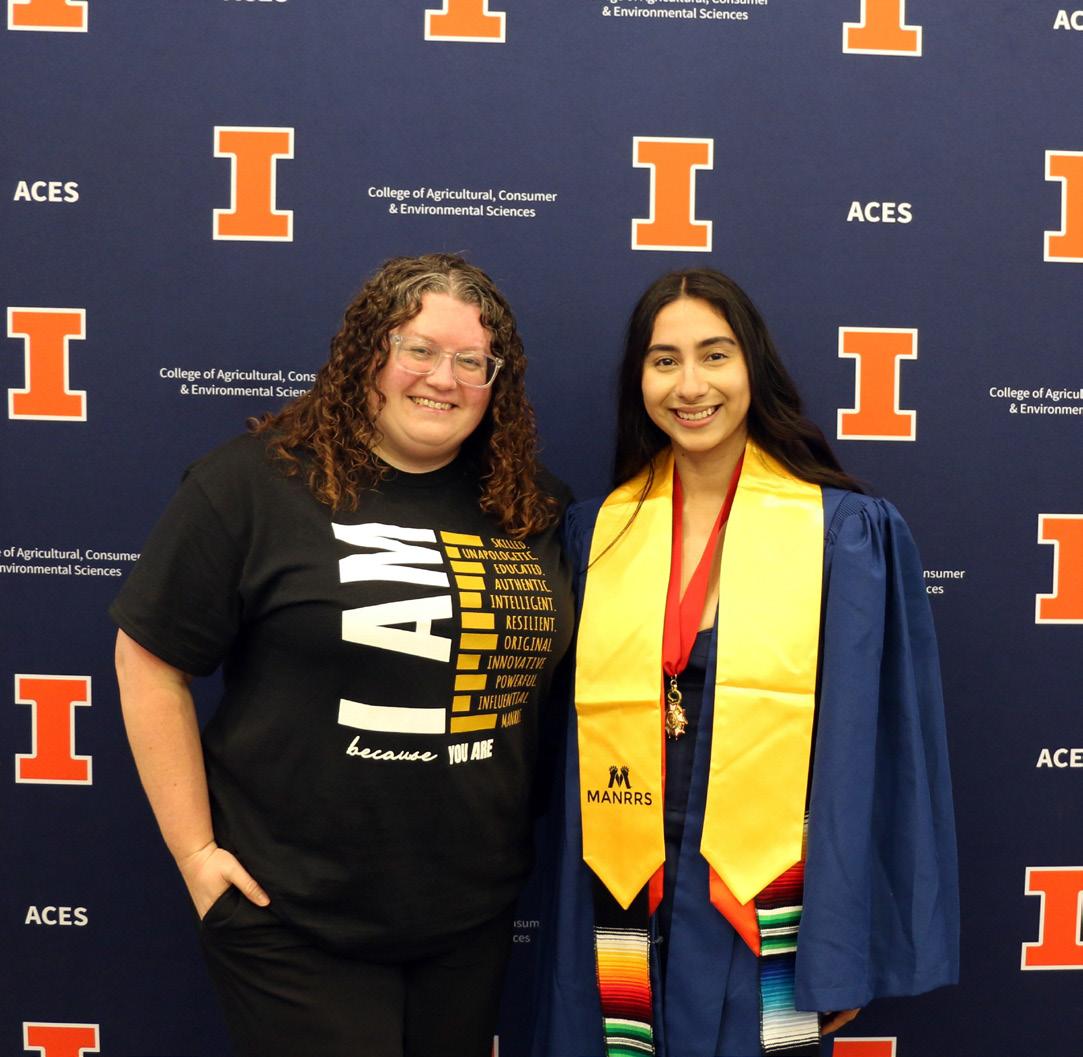
do now to build a legacy of belonging in ACES will open doors for the next generation of students, a generation we know is increasingly diverse,” Olson said. “This is great a diverse
community brings richer perspectives, deeper learning, and stronger outcomes for all. When we remove the barriers to allow more people to fully participate in our work, we raise the bar for what’s possible.”
Because ‘DEI work’ involves enhancing community spaces like MANRRS, mentorship opportunities, scholarships, inclusive pedagogy, accessibility, workforce development, and more, Olson reiterated that “an investment in DEI is really an investment in the future of our college. It strengthens everything we do in our classrooms, our labs, and our communities.”
To invest in ACES’ inclusion initiatives, visit go.aces.illinois.edu/give Select “Other” as the gift designation, and enter “ACES DEI General Fund – 342897.”
To meet the urgent demand for veterinarians trained in livestock care, the University of Illinois UrbanaChampaign has created a new early admission pathway for ACES undergraduates pursuing food animal careers.
Through a partnership between the College of ACES and the College of Veterinary Medicine, eligible students can apply in their sophomore year and secure a coveted vet school seat years ahead of the traditional timeline.
“This is one way we can support students passionate about healthy herds and strong food systems,” said Anna Dilger, professor of animal sciences. “It gives them the confidence and focus to dig deeper into hands-on learning early on.”
The program is designed for students who maintain a 3.5 GPA and complete livestock-focused coursework in areas like beef production and animal feeds real-world topics not always covered in traditional veterinary curricula. Early acceptance allows them to tailor their undergraduate experience toward the unique demands of food animal practice.
“The veterinary profession has identified the need for more practitioners in the food animal and mixed animal fields, especially in rural areas,” said Sara Connolly, assistant dean for admissions and student success at Vet Med. “We hope the early admissions program will help address this need, particularly in Illinois, by encouraging future veterinarians with a food animal interest.”
As ACES continues to lead in addressing workforce needs across agriculture and allied fields, programs like this reflect the college’s commitment to responsive, mission-driven education that benefits communities statewide.


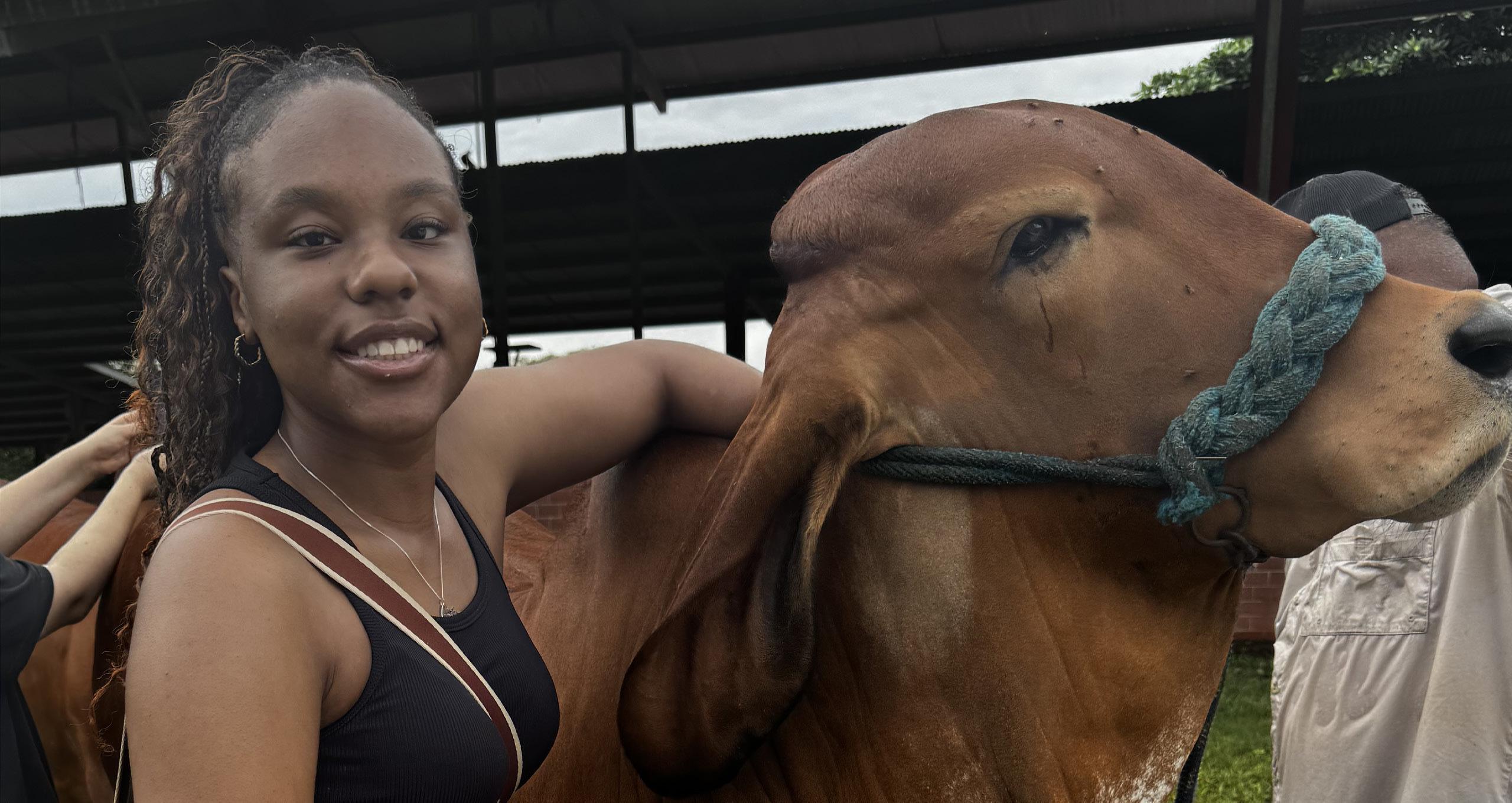
From their first year, ACES students gain a global perspective that shapes their journey.
International study opportunities are transformational experiences that cultivate curiosity, expand students’ worldviews, and prepare them to lead across borders.
In the College of ACES, this commitment to global engagement begins early, with First-Year Experience Study Abroad Programs designed to help new students step into the world and into their potential as global citizens.
One such program took 15 students to Panama over winter break, led by Agricultural Leadership, Education, and Communications instructor Gary Ochs and study abroad coordinator Roxanne Patiño. There, students immersed themselves in the country’s culture and agriculture, engaging firsthand with local producers and practices.
“This whole experience from the eight-week course to the ten days in Panama was incredible,” said Sa’nyi Burrell, a freshman in the Department of Animal Sciences, who traveled to Panama this winter. “It made me more globally aware of agricultural practices, issues, and innovations
in other countries compared to the U.S. I would highly recommend this program to future students.”
Burrell’s experience echoes a larger pattern: nearly one-third of ACES undergraduates participate in study abroad, far outpacing the national average. At Illinois, global learners report stronger critical thinking, intercultural competence, and career readiness.
With nearly 50 ACES programs around the world from sustainable food systems in Italy to internships in South Africa there’s a global opportunity for every interest and career path.
These programs are embedded in ACES’ inclusive and career-focused approach, affirming our belief that students shouldn’t just study the world they should be empowered to improve it.
To support ACES students in pursuing life-changing study abroad experiences, visit go.aces.illinois.
edu/give. Select “Other” as the gift designation, and enter “ACES Study Abroad Fund – 343561.”
Your generosity helps ensure that cost is never a barrier to global learning.
When the Feed the Future Soybean Innovation Lab wrapped its 2024 retreat and board meeting in December, there was no indication of what was to come.
“All signs suggested we were doing a remarkable job,” said SIL Director Peter Goldsmith, an emeritus professor in the Department of Agricultural and Consumer Economics. “The annual meeting couldn’t have been more positive. The board was happy, our partners were happy. We were doing the right things.”

So when Goldsmith received the order to stop work in February, it felt like a lightning bolt.
“You’re doing all the right things, and now you’re not doing anything. What do you do?”
The order was the result of SIL’s longtime sponsor, U.S. Agency for International Development (USAID), abruptly shutting down. In an instant, 12 years of progress developing Africa’s soybean value chain ground to a halt.
The shutdown affected all of SIL’s programs, including its hugely successful Pan African Soybean Variety Trials that operated across 30 countries and yielded 338 locally adapted commercial varieties. The closure also meant no
one would administer and maintain SIL’s online agronomic training platform or its social media forums for early disease detection and mitigation. Recent developments in farm machinery looked likely to stall out, leaving smallholder farmers to continue planting and harvesting by hand.
When it became clear that USAID wasn’t coming back, Goldsmith made the heart-wrenching decision to lay off SIL’s 30 employees and close the lab on April 15. But in the weeks leading up to the closure, Goldsmith worked every angle to keep the program afloat. With less than a week to go, Founders Pledge came through with a $1 million gift to keep SIL open for another year.
While durable federal investments are necessary to support the previous scale of SIL’s work and that of the university as a whole, the gift buys Goldsmith time to secure more stable funding going forward.
The key to SIL’s success is establishing responsive relationships with local partners who can explain the challenges farmers face on the ground. Through its researchfor-development approach, SIL then conducts research or taps its network to deliver demand-driven solutions.
It’s a winning formula, according to Carl Jensen, CEO at Good Nature Agro in Zambia.
“Soybean was an afterthought for most Zambian farmers when SIL first started working in the country,” he said.
“SIL started by promoting the economic and agronomic feasibility of soybean and greatly contributed to the rapid growth of soybean as a leading complement to maize, with nationwide production jumping from less than 150,000 metric tons in 2017 to over 600,000 in 2023.”
Similar success stories are common across SIL’s focus areas, including much of Malawi. But the country’s southern region, with its hotter, low-elevation environment, presented

challenges SIL and local partners had just started digging into before USAID collapsed.
Bruce Carruthers, who consults for Agricane in southern Malawi, said, “SIL’s efforts are strategically positioned to expedite the registration of new varieties for both rainyseason and dry-season production, an advancement that will mark a significant milestone in Malawian agriculture.”
Southern Malawi won’t be the only beneficiary of SIL’s continued work. Goldsmith says U.S. commodity markets and agribusinesses have specific incentives for Africa to build its soybean value chain.
“Our work directly advances U.S. interests by opening and de-risking new trade opportunities for U.S. farmers and agribusiness firms and ensures national security by creating strong, growing, and stable economies overseas,” Goldsmith said. “Specific to Illinois, soybean farmers, traders, equipment manufacturers, processors, and food and feed firms now have access to one of the fastest-growing soybean markets in the world in the last frontier opportunity for soybean market expansion. Without SIL, there’s no plan B.”

Continued funding keeps African and world soybean markets moving in the right direction. To support SIL’s work, visit go.aces.illinois.edu/give Select “Other” as the gift designation, and enter “Soybean Innovation Lab Support Fund – 336899”
As a first-generation college graduate working in animal nutrition, Elizabeth Brinkman never thought she’d return to school. But her deepening interest in companion animal nutrition and her desire to have a bigger impact led her to the College of ACES’ Online Programs.
“I genuinely enjoy my work here, and I didn’t want to risk leaving and not having a spot when I got back,” said Brinkman, an animal nutrition scientist at ADM. “The flexibility of the program allowed me to balance my job and studies, with deadlines and assignments designed for working professionals.”
Brinkman first enrolled in the Companion Animal Nutrition certificate program through ACES Online, encouraged by a coworker and supported by ADM’s tuition assistance. When she chose to continue on to the online Master of Animal Sciences, she found a mentor in Professor Maria Godoy.
“Dr. Godoy was incredibly supportive and willing to be my advisor,” Brinkman said. “Her guidance and the structure of the program were crucial in helping me continue my education while maintaining my full-time job.”
Today, Brinkman applies her expanded expertise to help improve pet health and well-being. “ACES Online provided me with the opportunity to enhance my expertise and continue advancing in my field.”

“ The flexibility of the program allowed me to balance my job and studies, with deadlines and assignments designed for working professionals.”
This fall, the college launched a new website for ACES Online Programs the gateway to 80+ flexible, careeradvancing options for adult learners. Designed for working professionals, the offerings span self-paced short courses, stackable certificates, and fully online degrees.
Highlights include:
• 7 online master’s degrees
• 25 graduate and undergraduate certificates
• 54 non-credit certificates and specializations
As of May 2025, more than 180,000 learners are enrolled in Coursera courses offered by the College of ACES. These courses are open to anyone, self-paced, 100% online, skillsor topic-focused, and typically only require an average of 6 hours to complete.
Last year, ACES Online added 10 new online credit-bearing courses and launched five new graduate certificates that can be stacked toward a master’s degree, expanding opportunities for upskilling across industries.
Whether learners want to deepen their expertise, change careers, or lead in their field, ACES Online offers a flexible, affordable way to move forward without missing a step. Visit acesonline.illinois.edu to learn more.
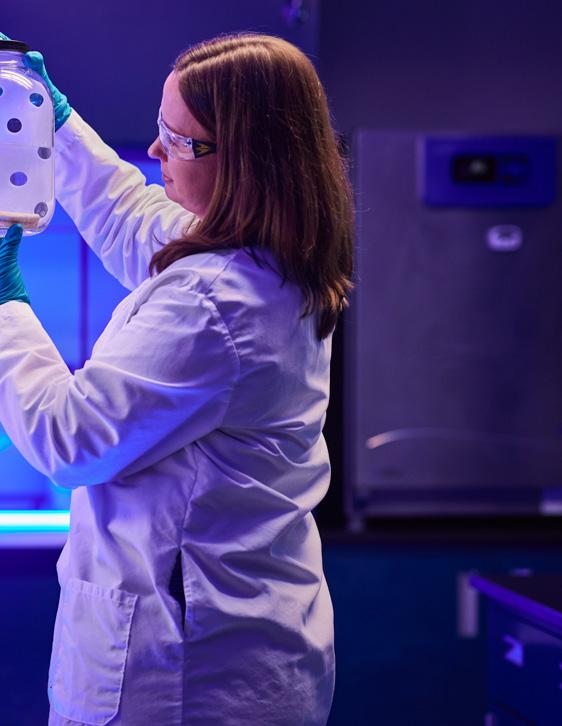
To help ACES Online create accessible, highquality learning experiences, consider supporting the ACES Learning Innovation Laboratory (ALIL) a new collaborative space equipped with emerging technologies to help faculty design engaging, transformative online content. Make a gift online at go.aces.illinois.edu/give and select “ACES Learning Innovation Laboratory Fund.”

ACES small grains breeder helps farmers tap into the power of wheat-soy double cropping.
Jessica Rutkoski, a small grains breeder in the Department of Crop Sciences, is helping to expand the practice of wheat-soy double cropping in Illinois. While double cropping planting wheat in the fall and soybeans immediately after wheat harvest in early summer has long been practiced in Southern Illinois, Rutkoski’s work is making it more viable farther north and more profitable overall.
Double cropping relies on timing: harvesting wheat early enough to give soybeans enough of the growing season to yield well. Rutkoski’s breeding program is addressing this challenge head-on. “A big trait of interest, in addition to yield and scab resistance, is earlier maturity,” she explained. “Earlier-maturing wheat allows soybeans to be planted sooner, which improves their yield potential.”
Matt Wehmeyer of AgriMAXX Wheat said, “As the growing season shortens in the northern part of the state, earlier wheat maturities are increasingly important for growers wishing to double crop. Dr. Rutkoski’s program provides a unique focus that brings value to producers wishing to harvest wheat earlier for the added bonus of double crop soybeans.”
Rutkoski’s breeding program has become a leader in producing these extraearly wheat varieties. Her program licenses varieties to seed companies, which distribute them under various commercial brands. While the Illinois name may not always appear on the bag, the genetic innovations stem from her work and that of her predecessors at the university.
This genetic advancement is making wheat-soy double cropping more appealing in parts of the state where it previously wasn’t feasible. It’s also helping meet rising interest from farmers who want the economic and environmental benefits of two harvests in one season. “The primary reason people adopt double cropping is the economic potential,” Rutkoski said. “But there are important secondary benefits, too covering soil throughout the year, reducing erosion, and improving soil health through continuous root growth.”
The success of Rutkoski’s program comes at a fortuitous time for wheat production in the state. Illinois wheat growers recently adopted a checkoff program that will start in 2026.
“Illinois has emerged as a top wheat state in the eastern U.S. in terms of acreage and average yield. However, compared to other states in our region, little research is done to optimize management,” she said. “This checkoff provides a way for wheat growers to fund research and education that specifically addresses growers’ priorities.”
Avian flu has infected poultry flocks, dairy herds, wildlife, and humans, raising public concerns not to mention egg prices.
College of ACES faculty and Illinois Extension specialists are cutting through the confusion with science-based guidance.
With the majority of human cases resulting from exposure to infected dairy cattle or poultry, it’s not surprising that the public has questions about the safety of milk and poultry products. But Jim Drackley, professor emeritus in the Department of Animal Sciences, says cooking and pasteurizing are effective in eliminating the pathogen.
“I would say the risk to humans is incredibly small from dairy products we consume from stores,” he said. “I would caution against consuming raw milk, which could harbor live virus.”
When wild birds die on private property or en masse, as has been the case with waterfowl in multiple Illinois locations,
ACES experts caution the public to avoid handling the birds unless absolutely necessary.
“It is unlikely handling dead birds would lead to an infection, but it is best to follow public health guidelines and wear gloves, safety goggles, and a mask,” said Joy O’Keefe, associate professor in the Department of Natural Resources and Environmental Sciences and Illinois Extension specialist. “Avoid touching your face and wash your hands thoroughly afterward.”
Feeding ducks and geese at local ponds? Not a good idea, said NRES professor Mike Ward. “It’s a bad habit for many reasons, but now there’s the added risk of spreading avian flu among birds.”
Songbirds are less susceptible to avian flu, so backyard feeders are unlikely to pose a threat to birds or humans.
In fact, the USDA recommends against removing sources of food, water, and shelter for wild songbirds unless the property also houses poultry. O’Keefe says cleaning bird feeders regularly is a good idea to prevent the spread of pathogens.
Both Ward and O’Keefe say the best thing landowners can do to promote wild bird health and avoid overcrowding is to maintain large tracts of quality habitat, such as forest, shrubland, or prairie.

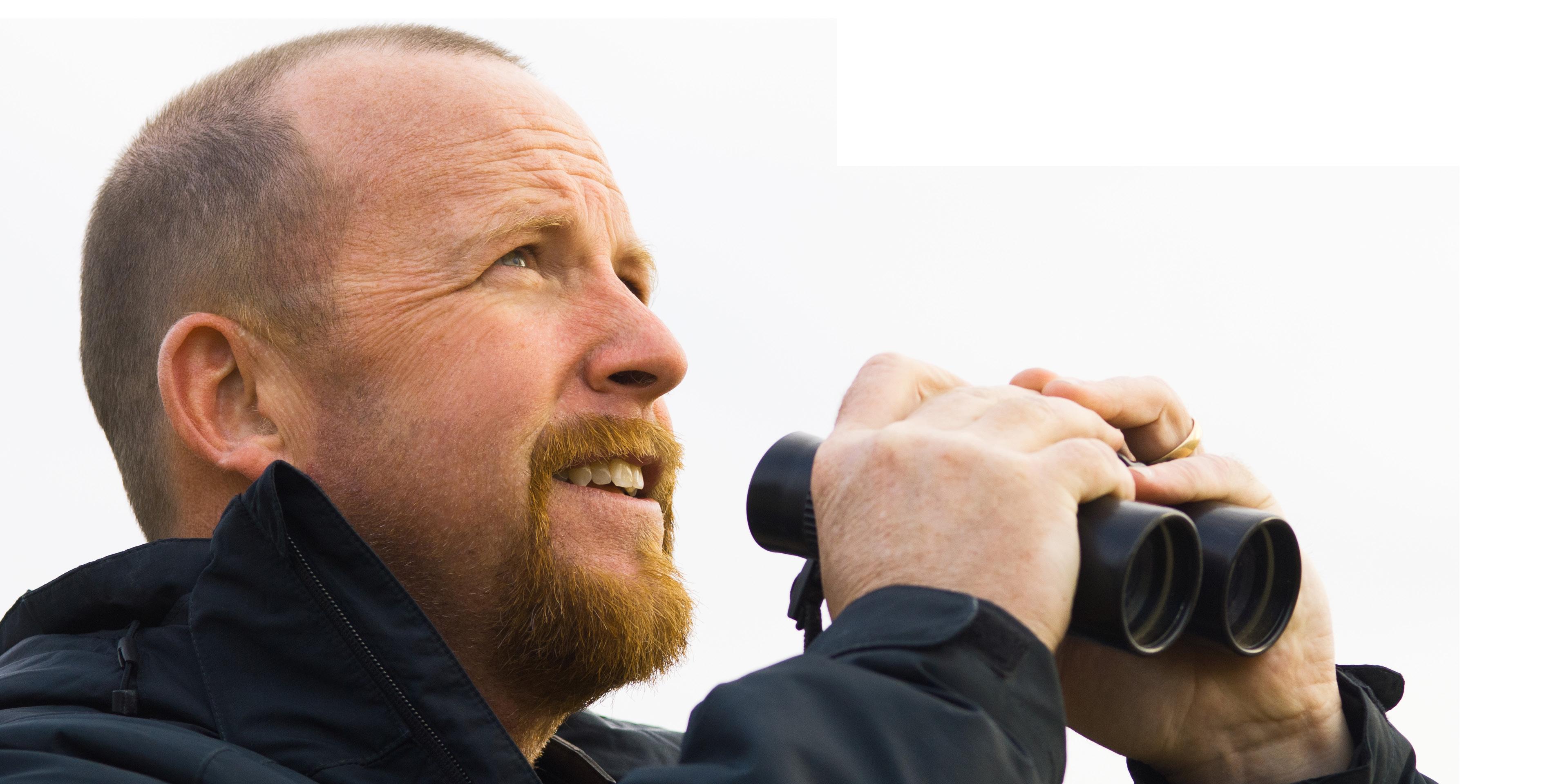

Red tape ties up a lot of leaders on their journey to the top. But not newly elected FFA President Thad Bergschneider his leadership journey started with duct tape, courtesy of his grandpa Joe.
“I was just five years old, feeding cows with my grandpa,” Bergschneider said. “My winter coat wouldn’t zip up, so instead of fixing it, he just duct-taped it together and threw me in the feeding trough.”
And now, some 15 years later, Bergschneider believes that experience introduced him to leadership: learning by doing, figuring things out as you go, and not being afraid to get your hands dirty.
With over one million members nationwide, FFA is far more than an extracurricular activity. Bergschneider, an ACES student majoring in agricultural and consumer economics, calls FFA “a leadership powerhouse, preparing students for leadership in agribusiness, policy, and innovation.”
Bergschneider is one of those leaders. His journey in FFA began at Franklin High School, where he was actively involved in his chapter. His dedication to the organization and passion for agriculture propelled him to run for national office, a role he believes gives him a chance to advocate for the industry and foster stronger connections among its leaders.
“More than anything, leadership is about seeing solutions, taking that first step, and uniting people to work toward those solutions,” Bergschneider said. “Leaders in agriculture don’t just talk about problems they start movements.”
Now, as National FFA President, Bergschneider will spend the next year traveling the country, meeting with students, industry leaders, and policymakers to advocate for the future of agriculture. His message is clear: leadership isn’t about a title it’s about taking action and inspiring others to do the same.
Looking ahead, Bergschneider plans to put his degree from the University of Illinois to good use by pursuing a career in the agribusiness industry. Regardless of where he lands, he intends to use his platform to ensure a strong future for American agriculture.
“ Leaders in agriculture don’t just talk about problems they start movements.”

A new partnership transforms student-raised livestock into food for Illinois families.
A new partnership is transforming the outcome of the Illinois State Fair Sale of Champions turning student-raised livestock into a powerful force for good.
For the first time this year, meat from champion animals and winners of the processed meats competition is being donated to food banks across the state. The initiative is the result of a formal agreement between the College of ACES, Illinois Department of Agriculture, and Feeding Illinois.
Eighty percent of the donated meat supports food-insecure families through the Feeding Illinois network, while the remaining 20% fuels research, workforce training, and public education at the ACES Meat Science Laboratory.
“This effort reflects the very best of our land-grant mission connecting the hard work of Illinois youth with service to our broader community,” said Anna Dilger, professor of meat science in the Department of Animal Sciences.
The program’s thoughtful logistics freezing meat for distribution as capacity allows ensure that no resource is wasted and help extend impact throughout the year. Youth exhibitors are invited to visit the Meat Science Lab, see the processing firsthand, and preserve their animal’s hide as a keepsake. They’re also celebrated at Celebrate Food and Ag Day, honoring how their efforts contribute to meaningful change.
Among 2024 champions was Olivia Shike, whose grand champion barrow will help feed families across Illinois.
“It’s an honor to have my work recognized and to be part of something that gives back in such an important way,” she said.
These exhibitors represent the future of agriculture as members of Illinois 4-H, the flagship youth development program of University of Illinois Extension. Through experiences like this, they learn not just how to raise livestock, but how to raise up our communities.
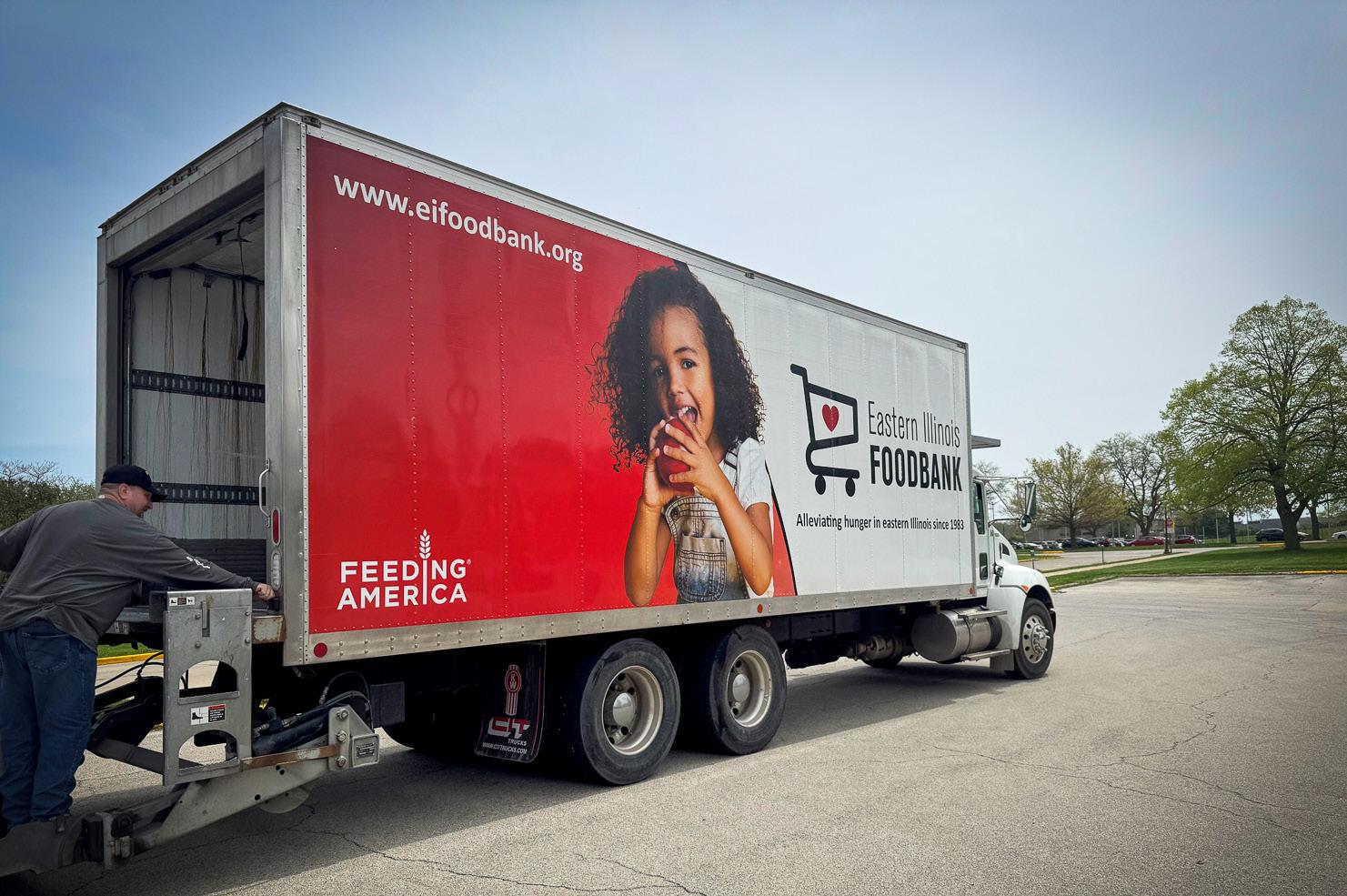
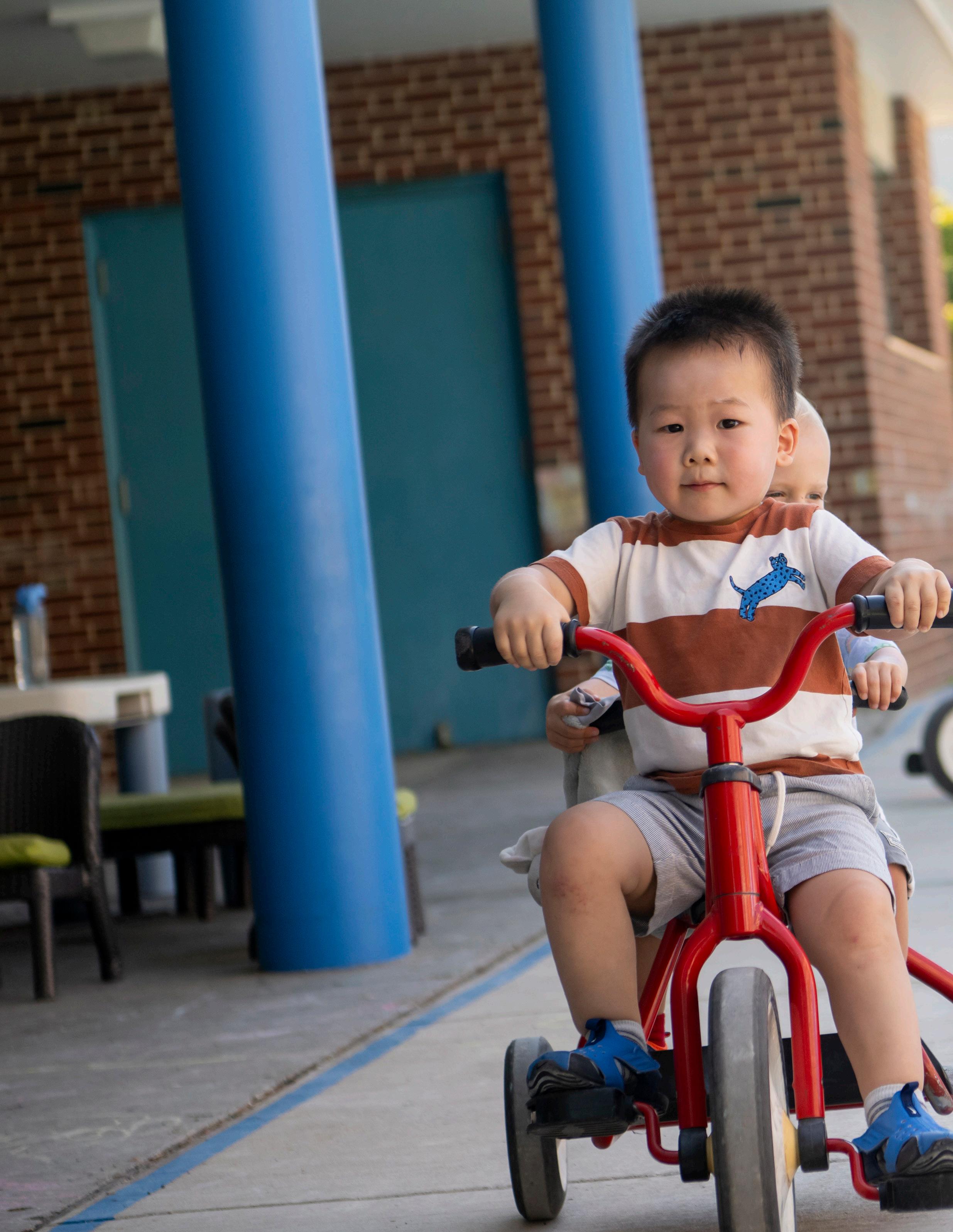
At first glance, the Department of Human Development and Family Studies might not seem like an obvious fit within the College of ACES. But its place in the college is both historic and foundational.
HDFS traces its origin back to the School of Domestic Science and Arts, which was established at the University of Illinois Urbana-Champaign in 1872 to provide instruction in “arts of the household” and an opportunity for women to pursue a college education. Later rebranded as the Department of Home Economics, it eventually split into separate disciplines, including food and nutrition (now the Department of Food Science and Human Nutrition) and Child Development and Family Relationships the precursor to HDFS.
“We’re part of the original vision of the university and the landgrant mission, which opened higher education to women and other marginalized groups. We continue to conduct rigorous scientific research and translate that knowledge into policies and programs that promote human thriving,” said HDFS Department Head Ramona Oswald.
Today, the department excels in multiple focal areas, from youth development to couple relationships to the impact of discrimination, united by a commitment to address the lived experience of its constituents.
HDFS research covers the entire human lifespan from infancy to old age with a strong emphasis on youth development. Scholars explore how to foster autonomy, identity, interdependence, and civic mindedness in young people. This work builds on the legacy of Professor Emeritus Reed Larson, an internationally renowned leader in positive psychology and youth development.
For example, Kelly Tu’s research on parent-child interactions informs parenting strategies that help kids deal with stressful school and peer challenges. Nancy McElwain uses the innovative LittleBeats technology to study infant sleep patterns and emotional regulation in real-world settings, providing crucial insights into infant development and health outcomes.
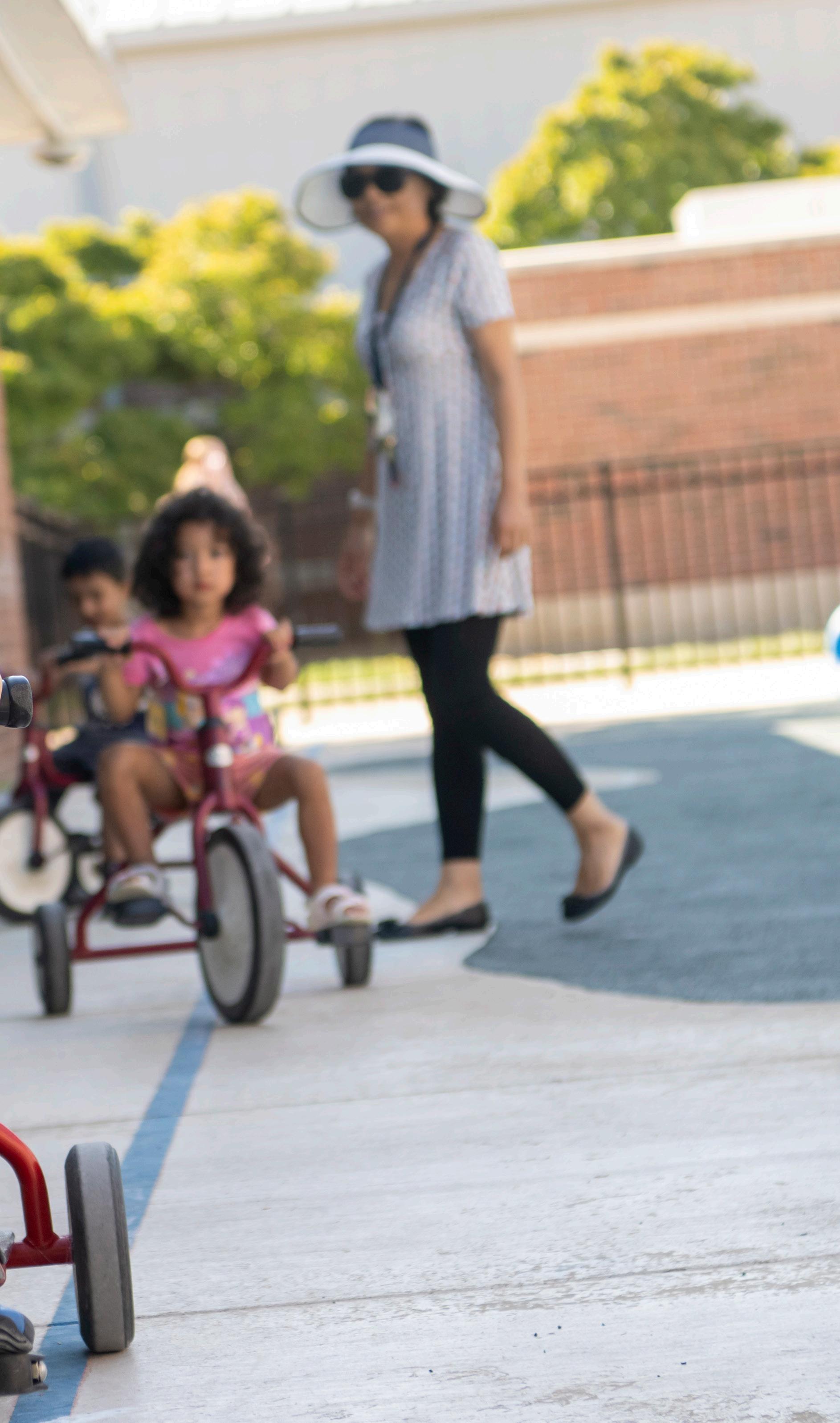
HDFS also places significant emphasis on couple relationships. Allen Barton leads the Illinois Strong Couples program, which provides no-cost relationship support through Illinois Extension. Participants report reduced conflict, improved co-parenting, and stronger partner support.
“When you strengthen something so central to people’s lives like marriage and romantic relationships it benefits other aspects of life as well,” Barton said. “Research shows that strong, stable relationships positively impact adults, children, workplaces, communities, and even the broader economy.”
Jennifer Hardesty and Brian Ogolsky have spearheaded research on a different aspect of relationships the role of domestic violence in divorce cases. They have developed training programs that are changing the way lawyers and judges view intimate partner violence in divorce proceedings.
Shardé Smith is one of several HDFS researchers who studies the impact of racism on couples and parent-child relationships.
“A person’s experiences with racial discrimination are not just their own, but may spill over into the family and affect the mental health and perceived social support of other family members,” she said.
Alaysia Brown, who joined the HDFS faculty in the spring, investigates how systemic racism and discrimination affect the health and wellbeing of African American individuals, couples, and families. Her work integrates machine learning with traditional social science methods to examine how racial and ethnic discrimination shape relationship dynamics and contribute to racialized health disparities.
“The work we do in HDFS highlights the importance of developmental stages and how they change over time. Kids grow, relationships evolve, and communities change, and what people need to thrive can change over time and situation,” Oswald stated.
“We use science to understand individuals and relationships. Importantly, the scientific methods that we use combine objective measures and observations, with attention to how people perceive their own lives.”
To uplift this work and help support healthy families and communities, visit hdfs.illinois.edu/give
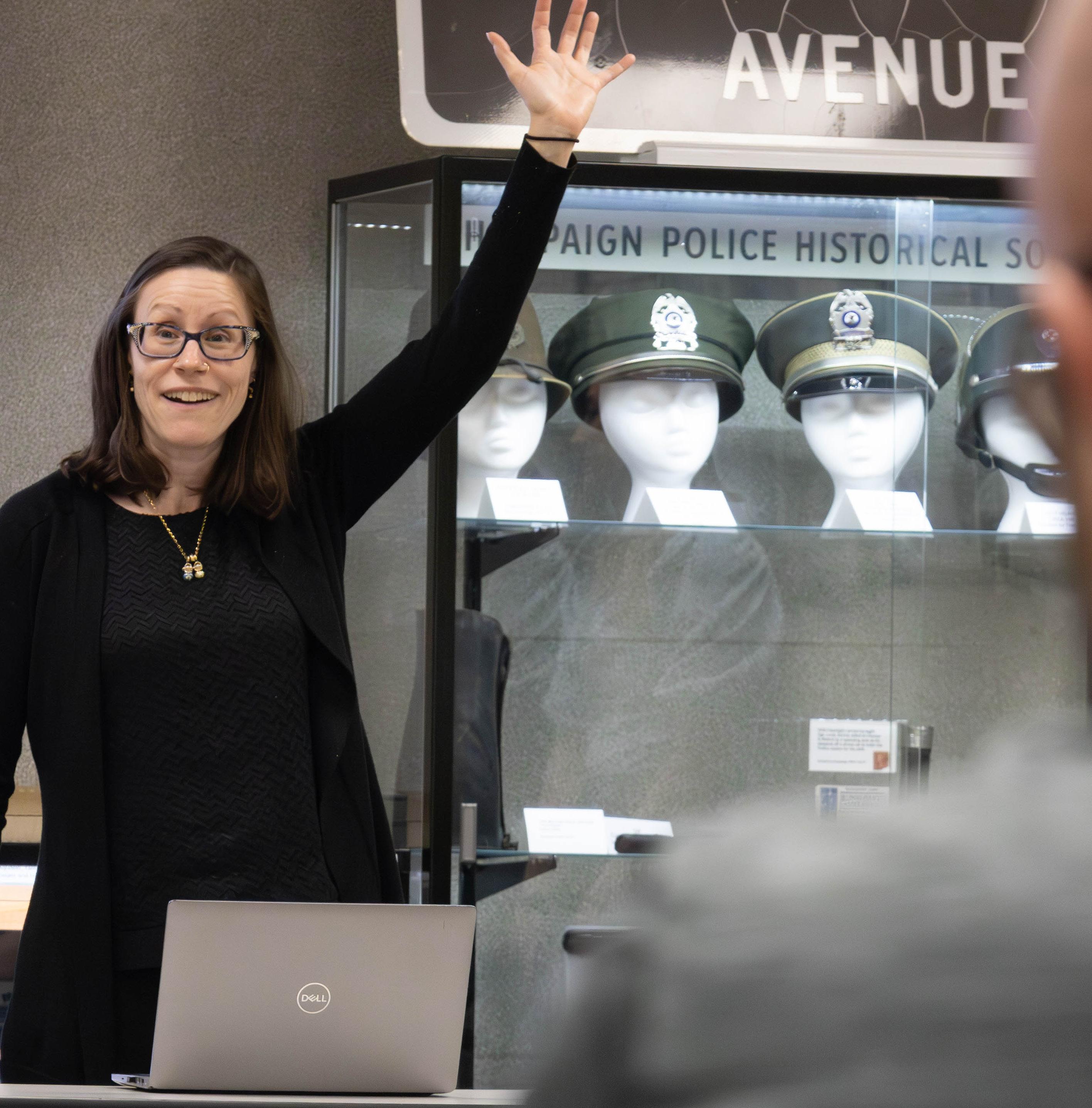
ACES advances equity through research rooted in community collaboration.
The Family Resiliency Center (FRC), housed in the Department of Human Development and Family Studies, brings together families, schools, and local nonprofit agencies and community partners to address “wicked” problems that is, complex problems that defy simple solutions and are best addressed through collaboration.
FRC addresses public health and social justice challenges through research partnerships that foster resilience, whether weaving mindful movement into preschool curricula or training high school students in research practices to tackle problems in their own communities.
The center’s work is grounded in community-based participatory research principles, which ensure that projects are designed with stakeholder input and promote long-term, sustainable practices and mutually beneficial actions, said Jacinda Dariotis, HDFS professor and FRC director.
For example, FRC partners with the Champaign County Mental Health and Developmental Disabilities Boards to build the capacities of over 20 board-funded agencies to evaluate the effectiveness of their own programming and
services. This training is both empowering and cost efficient, as the agencies are able to conduct evaluation work inhouse.
“The Family Resiliency Center has been very beneficial to us because we are now able to identify and meaningfully track the effectiveness of our programs and bring that back to our funders as a shining moment, as a success story,” said A.J. Zwettler, director of employment services at the Developmental Services Center, a local agency that serves individuals with intellectual and developmental disabilities.
Because family, youth, and community needs vary, FRC strives to be adaptive and tailored in how it approaches wicked problems in partnership with its community advisory board, steering committee, and collaborative partners.
The Family Resiliency Center is always seeking new collaborators community organizations, educators, and advocates who are eager to co-create research-driven, equity-centered solutions. If your organization is interested in partnering to improve public health, family resilience, or community wellbeing, visit familyresiliency.illinois.edu or reach out at familyresiliency@illinois.edu.
Pictured: FRC Director Jacinda Dariotis presents to the Champaign Police Department about youth participatory action research.

Students serve up award-winning “Fruit-trition” bars at ADM-backed food challenge.
In September 2024, a cooking channel show came to life when ADM teamed up with the Department of Food Science and Human Nutrition to host the Food Innovation Challenge.
Undergraduate and graduate students signed up in teams of four, each paired with a mentor from ADM. Armed with an ingredient list, their mission was to develop a new breakfast or snack grab-and-go item.
The youngest team in the competition, made up of four sophomores, secured first place with their “Fruit-trition” breakfast bars.
“We were in disbelief,” said team captain Alysha Haverkos. “We didn’t think we’d win, especially with so many other innovative products that we competed against.”
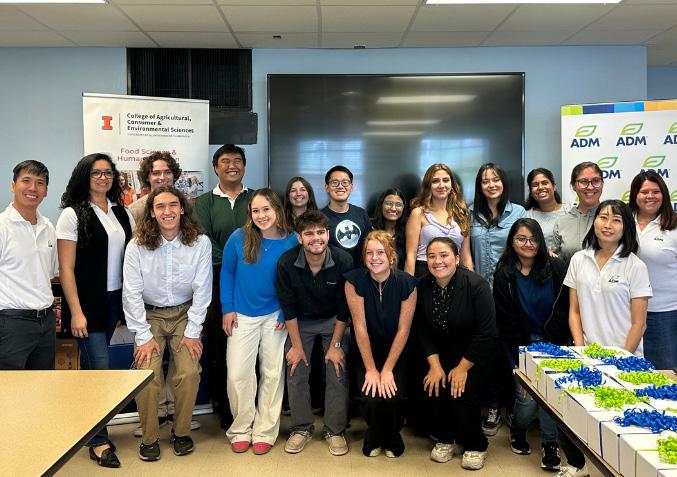
Unlike typical competitions, this event encouraged teams to collaborate, allowing them to share tips, tricks, and ideas.
“The advice from our older, more experienced competitors was invaluable,” Haverkos said. “We all won together.”
To partner with the College of ACES on experiential learning opportunities that connect students with real-world challenges, contact the Office of Corporate Relations at acesadvancement@illinois.edu. From industry-sponsored competitions to hands-on internships, your support helps develop career-ready talent while advancing innovation in food, agriculture, and the environment.
Annual Report 24-25 | 25

The Department of Animal Sciences at the University of Illinois began with a strong foundation in production agriculture. Areas like swine, dairy, and ruminant nutrition have been central to its work from the start and they remain vital today. Over time, however, the department has expanded its focus. A key turning point came with the early establishment of an “immunology core,” which opened the door to research that connects animal science with human health.
This shift didn’t mean leaving agriculture behind. Instead, it built on that foundation, using practical expertise in animal care to explore how animals can help answer important questions in biomedical science.
Today, Animal Sciences holds more than $3.8 million in active NIH funding to advance biomedical research with direct implications for human health.
Pigs have become a key model for biomedical research at Illinois, largely because of their physiological similarities to humans. Their immune systems, brain development, and digestive functions closely resemble those in people making pigs useful for studying everything from early brain development to immune response.
The department’s immunology work played a central role in this shift. In the 1990s, Illinois built a group of faculty focused on animal immunology a rare focus in animal science departments at the time. Early studies in rodent models helped researchers understand how the immune system affects behavior, growth, and metabolism. As the limits of rodent models became clearer, researchers began adapting that work for pigs, developing tools to study immune function in larger animals. This was especially useful in understanding sickness behavior how animals behave and grow differently when they’re ill.
“We learned that the immune system doesn’t just fight disease,” said Rod Johnson, ACES associate dean for research and former ANSC department head. “It affects appetite, muscle growth, hormone balance, even behavior. Studying those links in pigs gave us a better understanding of why sick animals perform poorly and that has real value in both agriculture and medicine.”
This work laid the groundwork for translational research using pigs. Illinois researchers have contributed to the mapping of pig genomes, enabling more advanced studies in gene regulation, disease resistance, and animal health.
Johnson and others used pigs to study how immune challenges affect brain development work that has helped inform developmental biology and improve infant nutrition, including infant formula.
Professor Matt Wheeler’s lab has taken the pig model even further using pigs to test 3D-printed tracheal stents now

used in children with airway disorders and the RapidVent, an emergency ventilator developed by Illinois researchers early in the COVID-19 pandemic.
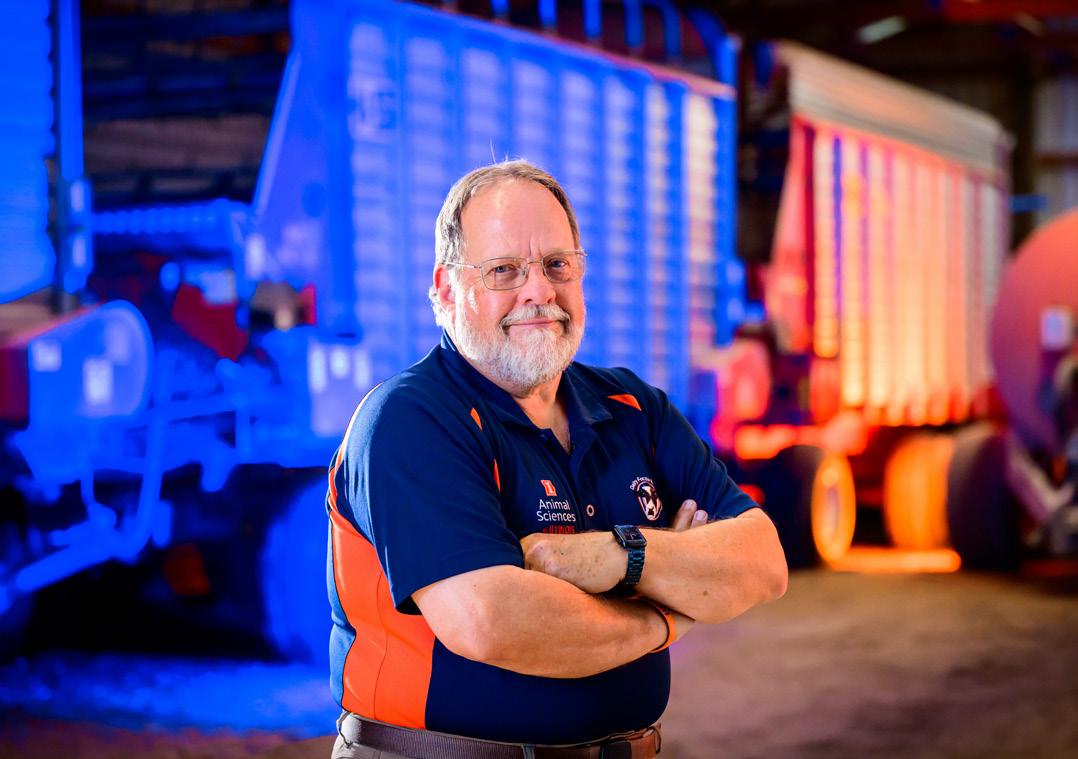
One of the department’s strengths is its ability to support other researchers. Illinois is one of the few places with the animals, infrastructure, and experience needed to carry out large-animal studies. Pigs are raised year-round on campus, which helps streamline projects and reduce costs. This practical setup makes it easier for teams from medicine, engineering, and private industry to get their research done.
“We’ve worked with people who had an idea for a device but no experience working with animals,” Wheeler said. “We help make their research possible from planning to testing to developing basic equipment and infrastructure that can accommodate large animals.”
Johnson added, “We don’t just do our own work. We create a space where others can succeed, too.”
The department is planning a new swine research facility with dedicated biomedical research space. It’s the next step in a long history of combining agricultural knowledge with scientific discovery.
“This is the land-grant mission in action,” Johnson said. “We’re still focused on food production, but we’re also finding new ways to improve health. And we’re proud to do both.”
Support Animal Sciences, and its pioneering biomedical research, visit ansc.illinois.edu/give. To explore giving opportunities, contact the Office of Advancement at 217-333-9355 or acesadvancement@illinois.edu.
ACES is partnering with USDA to preserve soybean diversity for a resilient future.
Inside a large walk-in refrigerator on the University of Illinois Urbana-Champaign campus, thousands of envelopes hold the fate of global food security, not to mention a significant portion of the world’s economy.
The National Soybean Germplasm Collection, maintained by a small but mighty USDA Agricultural Research Service team, is the country’s only public soybean seed bank, encompassing nearly the whole of the crop’s genetic diversity and impacting nearly every soybean product grown today not just in the U.S., but across the world.
Each seed contains unique gene combinations breeders can mine to create new soybean varieties that can withstand emerging threats. ARS and College of ACES scientists are constantly digging into the collection, but they’re not the only ones. Unlike privately held collections and those housed in other countries, ARS freely distributes seeds for research purposes to more than 400 requesters each year.
With hundreds of research groups mining the genetic repository each year, the collection has given rise to some of the most important soybean traits on the market.
“Most varieties grown in Illinois have resistance to soybean cyst nematode thanks to the collection,” said Brian Diers, soybean breeder and emeritus professor of crop sciences.
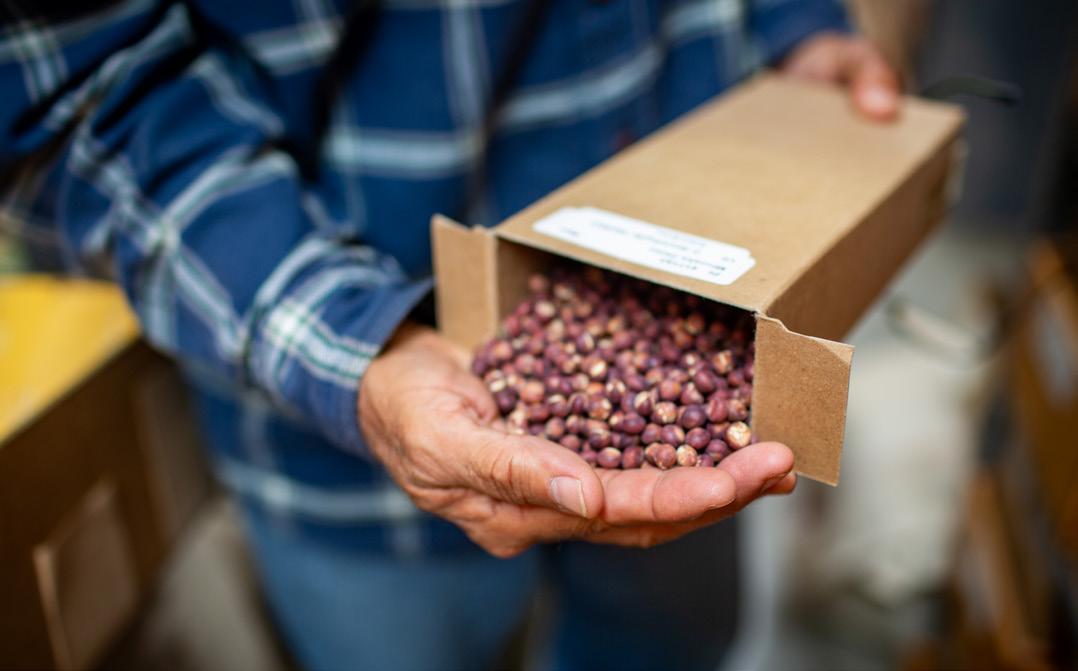

“Without that resistance, it’d be hard to grow soybeans profitably.”
The collection has also enabled resistance to economically important diseases like brown stem rot and Phytophthora in the U.S. and soybean rust in Sub-Saharan Africa, without which the continent’s nascent soybean industry would likely stall out. The collection has also enabled higher protein seeds and oleic acid levels, making soybean oil healthier and more stable.
With century-old origins, the world’s only soybean seed bank comprises seeds from nearly 23,000 soybean plants and their closest relatives, harvested from all over the world. Kept near freezing, the seeds remain viable for a decade. But that means every accession seed source must be taken out of storage every 10 years and grown to regenerate more seed for the collection.
It’s not easy, especially for accessions representing extreme maturity groups like those adapted to cold northern climates or perennial tropical varieties unaccustomed to the growing conditions of Central Illinois. Some years, the ARS team sows far more seeds than they harvest. But it’s well worth the trouble.
“It’s critically important to maintain this collection, because if it was lost, we would never be able to recover it,” Diers said. “Where would we get all those accessions again? We wouldn’t. This priceless genetic diversity would be lost to agriculture.”
While the collection has enabled major strides in soybean development worldwide, it has also been a boon for ACES scientists and Illinois farmers.
“Having that vast collection so accessible to U. of I. researchers directly benefits Illinois farmers,” said Abigail Peterson, director of agronomy for the Illinois Soybean Association. “Whether it’s a new disease or soy oleic, I think the germplasm collection is the only avenue to explore and develop new traits. It’s just a huge tool in our toolbox.”

With the soybean industry facing ever-changing pressures, it’s more important than ever to protect and invest in the National Soybean Germplasm Collection.
“There are always going to be instances where we will need to have access to this germplasm. The most prominent being when new diseases or insect pests occur, or when diseases that have been around a long time now start to become a more difficult challenge,” said Bob Reiter, former head of research and development in the crop sciences division at Bayer. “That’s where the collection becomes very important.”
Currently, ACES researchers are mining the collection for a solution to red crown rot, an emerging disease in the Midwest, and shoring up resistance to soybean cyst nematode, which has begun to evolve around existing resistance genes.
“The idea is to create varieties that have a more complete disease resistance package, not just SCN, but other diseases,” said Eliana Monteverde Dominguez, soybean breeder and crop sciences assistant professor. “You never know what’s coming. We’re starting to see diseases in Illinois that weren’t here 10 to 20 years ago. We have to be prepared.”
With new threats constantly on the horizon, the National Soybean Germplasm Collection isn’t just a resource it’s a promise. By keeping this genetic diversity alive and accessible, ARS and its ACES partners are helping ensure soybeans remain a reliable, resilient crop for years to come.
To ensure Illinois’ leadership in soybean innovation for generations to come, talk to your local representative about the value of the Global Soybean Germplasm Collection housed at the University of Illinois Urbana-Champaign.
College of ACES researchers are not just theorizing the future they’re testing it in the field. Girish Chowdhary, associate professor of agricultural and biological engineering, and Stephen Moose, professor of crop sciences, along with industry collaborators, recently wrapped up a five-year study deploying autonomous robots across cornfields. These robots roamed row after row, collecting high-resolution data that could revolutionize crop research and precision breeding.
Meanwhile, agricultural and consumer economics professors Madhu Khanna and Shadi Atallah turned their attention to one of the most stubborn threats in American agriculture: herbicide-resistant weeds. Their research zeroed in on waterhemp, a “superweed” that has evolved resistance to multiple herbicides, costing farmers millions in crop losses each year.
Khanna and Atallah explored a promising alternative robotic weed control. Their study examined not just the technology itself, but the real-world economics behind it. Under what conditions would farmers be willing to adopt robotic weeding? How bad does resistance need to get before the investment makes sense?
These are the kinds of questions AIFARMS Artificial Intelligence for Future Agricultural Resilience, Management, and Sustainability is answering with research grounded in science, guided by economics, and aimed at real-world impact.
AIFARMS focuses on applying AI to enhance agricultural practices in collaboration with other universities and the Donald Danforth Plant Science Center. Ongoing projects include autonomous farming, livestock efficiency, environmental resilience, soil health, and technology adoption.
AIFARMS is part of the Center for Digital Agriculture (CDA), which serves as a multidisciplinary hub that unites experts from engineering, agriculture, and data science to address global agricultural challenges.
The CDA has secured more than $33.5 million in federal support, including over $20 million in funding for AIFARMS, through the National AI Institutes for Agriculture program funded by USDA National Institute of Food and Agriculture and the National Science Foundation.
CDA’s primary research themes include automation, data analytics, and the integration of AI into crop and livestock management. These research enterprises include College of ACES faculty from the Departments of Agricultural and Biological Engineering; Agricultural and Consumer Economics; Animal Sciences; Crop Sciences; and Natural Resources and Environmental Sciences.
CDA emphasizes the development of a skilled workforce through innovative degree programs, including Computer Science + Crop Sciences and Computer Science + Animal Sciences majors, and the Master of Engineering in Digital Agriculture and professional certificate programs.
Additionally, CDA fosters industry partnerships, offering collaborative research opportunities and internships to bridge the gap between academia and the agricultural sector.
CDA researchers have also developed prototype autonomous farms, anticipating a world in which low-cost AI-driven systems enable breeders and farmers to boost yields and profitability while minimizing environmental impacts.
From autonomous tractors to intelligent crop analytics, ACES is redefining the landscape of agriculture. With CDA and AIFARMS leading the charge, the future of farming is smarter, more sustainable, and already taking root.

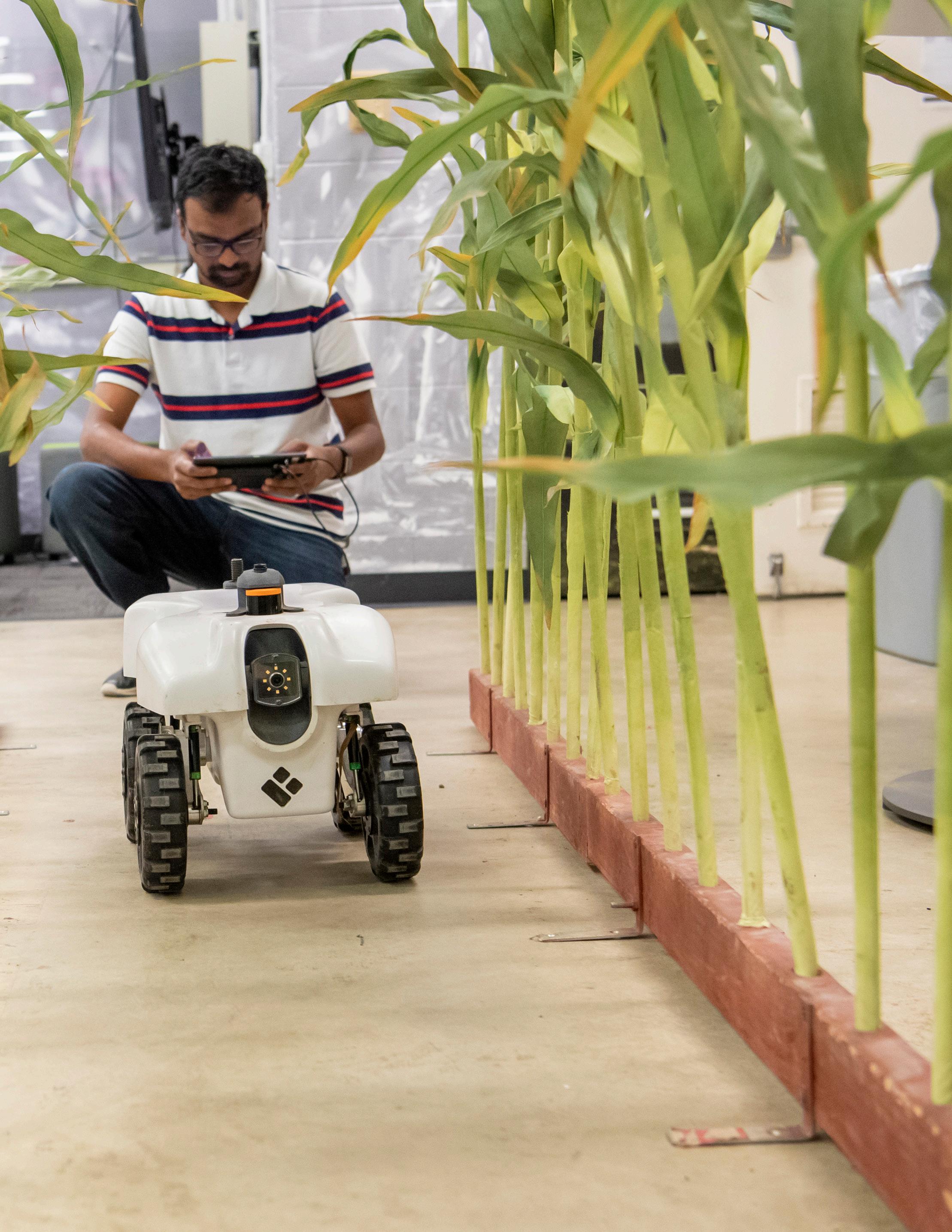
Farmers and industry leaders are vital to advancing digital agriculture. Whether you’re looking to pilot emerging technologies, inform cutting-edge research, or connect with world-class expertise, there are many ways to get involved:
• Join the CDA Industry Partner Program: This program offers opportunities to collaborate with researchers and field experts to address complex agricultural challenges. As a member, you’ll gain access to innovative technologies and cutting-edge research to advance your strategic goals.
AIFARMS is partnering with companies to develop AI-driven solutions for agriculture. Engaging with AIFARMS provides access to multidisciplinary research teams and the opportunity to contribute to advancements in agricultural resilience and sustainability.
• Participate in research and field trials: Both CDA and AIFARMS conduct on-farm research trials and pilot projects. Your farm can serve as a testing ground for innovative technologies, allowing you to be at the forefront of agricultural advancements.
• Engage in educational and outreach programs: These institutions offer various programs aimed at developing a diverse, technically skilled workforce in digital agriculture.
• Sign up for updates on AI AgriBench: This new benchmarking consortium, led by CDA, seeks to evaluate and build confidence in AI-driven question-answering systems supporting farmers, agronomists, industry, and the broader agriculture community. Learn more at go.illinois.edu/aiagribench and sign up go.illinois.edu/ aiagribench-form.
To express your interest or learn more about these opportunities, contact the Center for Digital Agriculture at digitalag@illinois.edu. Your involvement is crucial in driving the future of agriculture through innovation and collaboration.

The Data-Intensive Farm Management Project works with farmers in the U.S. and around the world to conduct large-scale scientific experiments using precision agriculture.
“Most agronomic science is conducted on very small university plots. Our team has created easy-to-use software and other resources so farmers and crop consultants can run big trials on entire fields,” said David Bullock, director of DIFM and professor of agricultural and consumer economics.
The goal is to generate real-world data that can help producers make efficient management decisions and increase profits. Farmers can sign up online to participate in the project at go.aces.illinois.edu/DFIM.
Neal Nelson and his father, Doug, have used DIFM on their western Illinois farm since 2017: “We utilize precision farming for variable rate planting, split applications of nitrogen, cover crops, and data collection in several trials each year. My hope is that DIFM can help develop updated nitrogen use guidelines for farmers across the country.”
DIFM is supported by the USDA National Institute for Food and Agriculture and the Natural Resources Conservation Service’s Innovation Grants On-Farm Trials program.
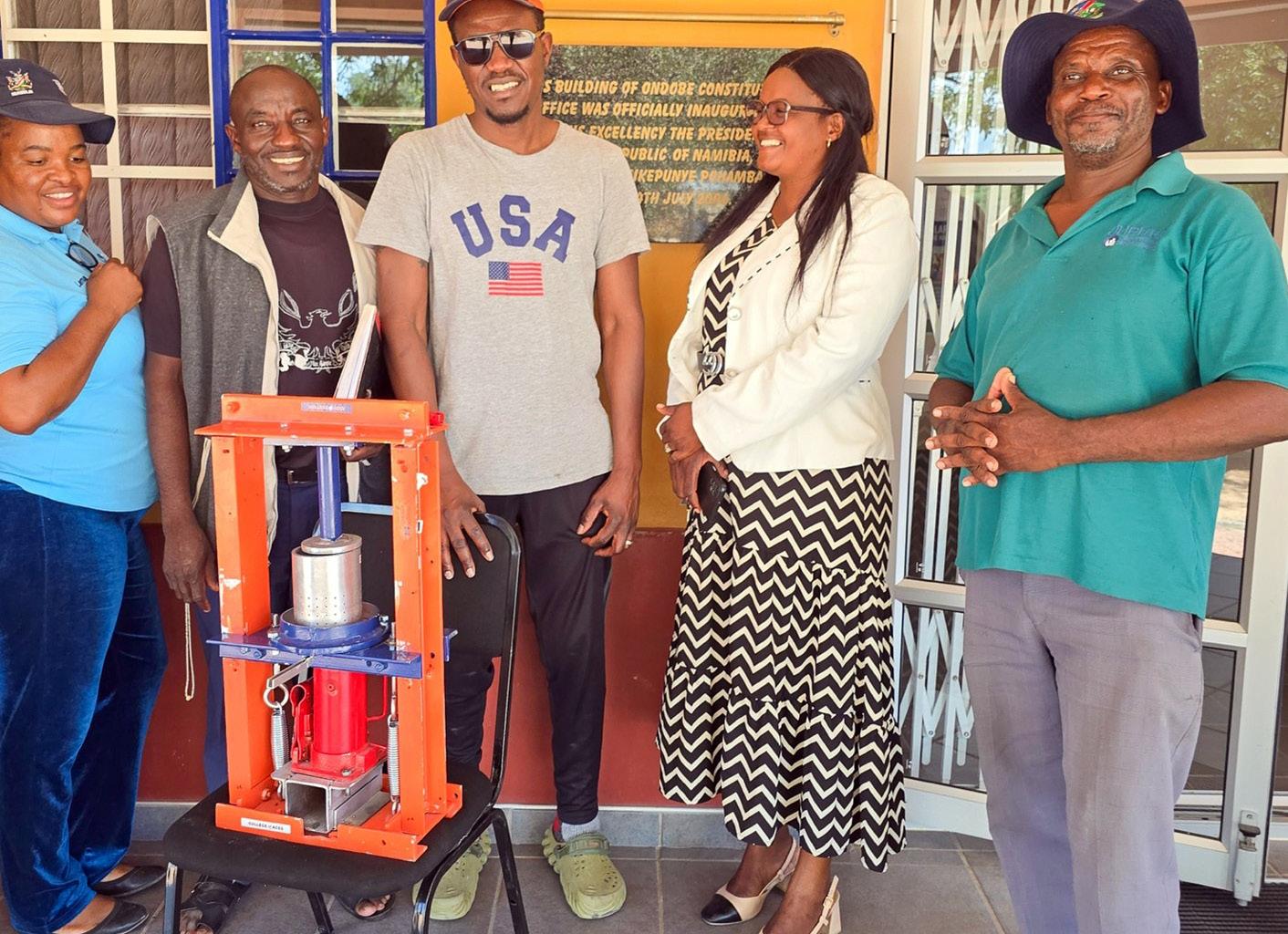
For generations, women farmers in Northern Namibia have extracted Kalahari melon oil using traditional methods labor-intensive processes passed down over centuries. Kalahari melon, native to Southern Africa, not only sustains agriculture as a hardy cover crop but also offers valuable oil used in cooking, hair products, and traditional medicine.
Jason Kandume, agricultural and biological engineering graduate student, traveled to Namibia to explore how technology could support these communities. With funding from a College of ACES International Graduate Grant and guidance from his advisor, Ann-Perry Witmer, Kandume introduced a simple, hand-powered device developed at Illinois to improve oil extraction efficiency.
Made from scrap metal readily available in local markets, the device is designed to be affordable, easy to use, and independent of electricity an important consideration in
remote areas. Kandume worked alongside women farmers and local officials to demonstrate the equipment, inviting farmers to test it firsthand.
“The feedback was incredibly positive,” Kandume said. “They were excited about how much time and effort the machine could save them compared to their traditional methods. This innovation has the potential to empower women and youth, expanding employment opportunities and helping to combat poverty.”
Through grassroots engagement and practical engineering, Kandume’s project exemplifies how a simple innovation can seed meaningful change nurturing not only crops, but also communities and livelihoods across the globe.
This project was made possible by the ACES International Graduate Grant, a donor-funded program that provides small grants to support student research and outreach abroad enabling transformative, community-driven projects with global impact.
To learn how you can support the International Graduate Student Grants, contact the ACES Office of Advancement at 217-333-9355 or acesadvancement@illinois.edu.
Growing up in the mountains of Lebanon, Johnny Baakliny was always interested in the natural world. As a teen, he was involved in anti-poaching initiatives that kept migrating songbirds safe from hunters and later spent summers tracking baby sea turtle survival on the shores of the Mediterranean Sea. Now, having relocated to landlocked, flatland Illinois, his passion for imperiled creatures is just as strong as ever.
As a master’s student in the Department of Natural Resources and Environmental Sciences, Baakliny has turned his attention to the endangered Indiana bat. The winged hunter was added to the federal endangered species list in the 1960s due to habitat loss. Populations had begun to rebound until white nose syndrome, a deadly fungal disease, was detected in 2007.

Although Indiana bat numbers are slowly recovering, Baakliny and his NRES advisor, Joy O’Keefe, want to do everything they can to help. Baakliny says the default bat conservation strategy for many land managers is artificial roosts, including bat boxes. But O’Keefe and her colleagues have shown that many bat box designs can do more harm
than good. Her group has pioneered a design that may be safer, and that’s where Baakliny comes in.
“My study involves implementing and field testing two of these designs. We hope it gives land managers a better idea of how to manage for this species. We’re not only refining a commonly misused tool to give land managers more effective options, but also aiming to understand bat behavior and roosting needs to inform conservation decisions.”
Management of historically misunderstood creatures is a theme for Baakliny. Prior to joining O’Keefe’s lab, he completed another master’s degree at the U. of I. studying southern Illinois’ famed “snake road,” which is closed to vehicles twice a year to protect migrating snakes and amphibians.
“Almost everywhere else in the world, snakes are vilified and not prioritized for conservation. It’s common to manage for pollinators or charismatic species, but for snakes, that’s rare,” he said.
His study combined archival research with a wildlife valueorientation survey and interviews of officials, locals, and visitors to examine how the site emerged as a unique model of snake-centered conservation and public engagement.
What he learned is something he can apply to his work with bats and whatever he chooses to study next. “People fear what they don’t understand,” he said. “Sometimes familiarity brings tolerance. But for conservation to really be successful, it needs local advocates to keep it going.”
For tips from the O’Keefe Lab on making bat boxes safer for bats, visit go.aces.illinois.edu/bat-boxes.


From almond groves to Illinois backyards, ACES economist Brittney Goodrich explores how pollinators fuel food systems and shape farm decisions.
Brittney Goodrich, assistant professor in agricultural and consumer economics, grew up among corn and soybeans in Iowa, but she became interested in beekeeping as a graduate student at the University of California, Davis.
Many crops, including cucumber, pumpkins, berries, and almonds require pollinators for fertilization. As native pollinator populations are declining, crop producers increasingly rely on commercial beekeepers to provide pollination.
When almond trees bloom in February and March, around 90% of the nation’s commercial bee colonies congregate in California. Goodrich’s research focuses on contract negotiations between beekeepers and almond growers.
“You can think of commercial beekeepers as livestock producers who engage in rotational grazing, moving colonies to the places where there are flowers blooming so the bees can find food. I’m interested in how beekeepers deal with risk in their operation and how that affects pollination contracts,” Goodrich said.
In California, Goodrich dove into hobby beekeeping, installing a hive in her front yard.
“It’s a lot of work to start up a colony. I had to feed the bees a gallon of sugar syrup every day for the first couple of months, and I didn’t harvest any honey the first year, because they needed to build up their stores. You also need to monitor for the presence of varroa mites.”
Up to 99% of bees are female worker bees, Goodrich said. Male bees, or drones, only live to mate with queen bees from other colonies and can’t feed themselves. “When a colony gets too large, the existing queen flies off with a swarm of worker bees to find a new home, and the remaining bees raise a new queen by feeding select larvae a substance called royal jelly.”
Since moving to Illinois last year, Brittney and her husband Ryan, also an assistant professor in ACE, haven’t started up their beekeeping hobby again, but they plan to do so and join the state’s thriving hobby beekeeping community. The state registered more than 5,400 beekeepers in 2024, and 89% of them are managing 10 colonies or less, according to the Illinois Department of Agriculture.
Learn more about beekeeping from Illinois Extension at go.aces.illinois.edu/extension-bees
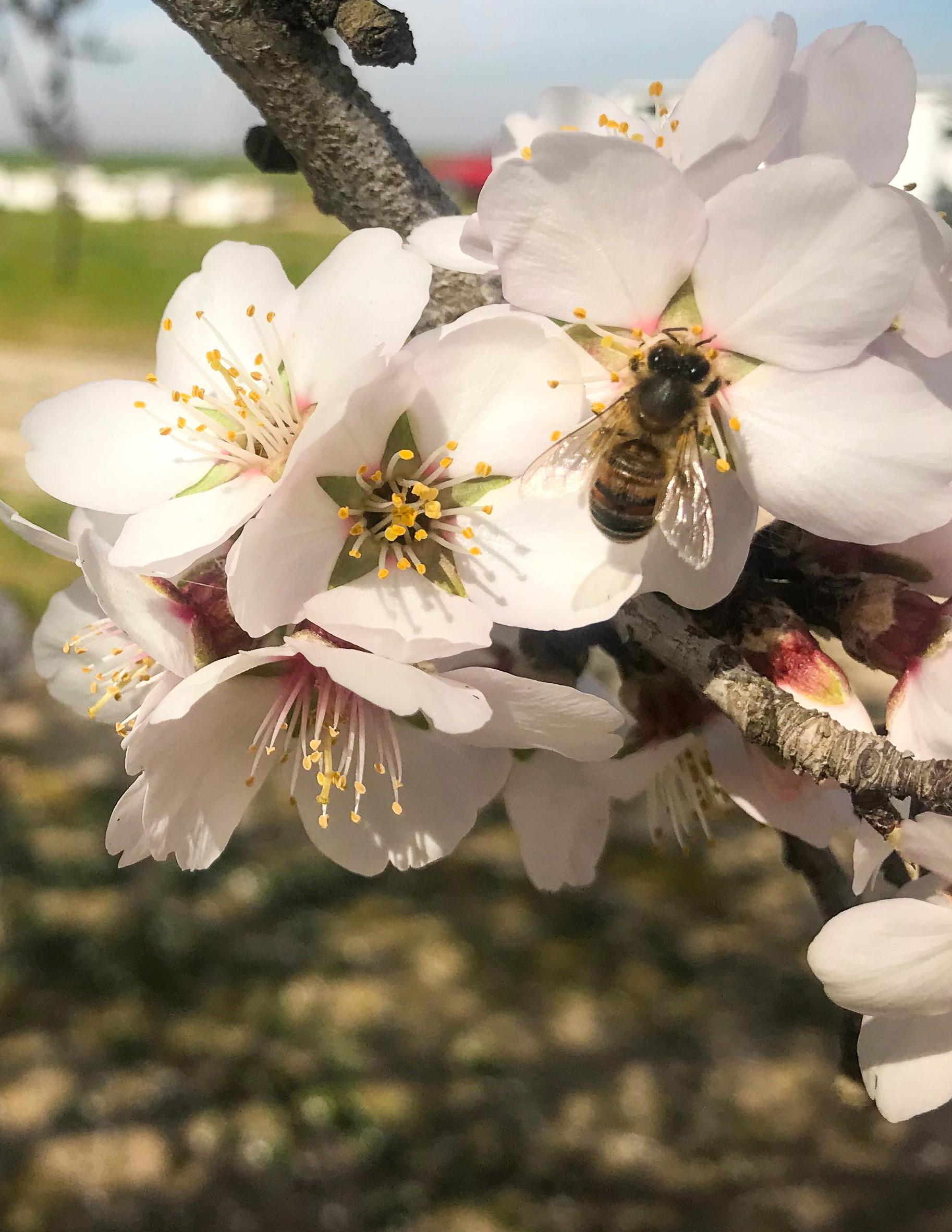
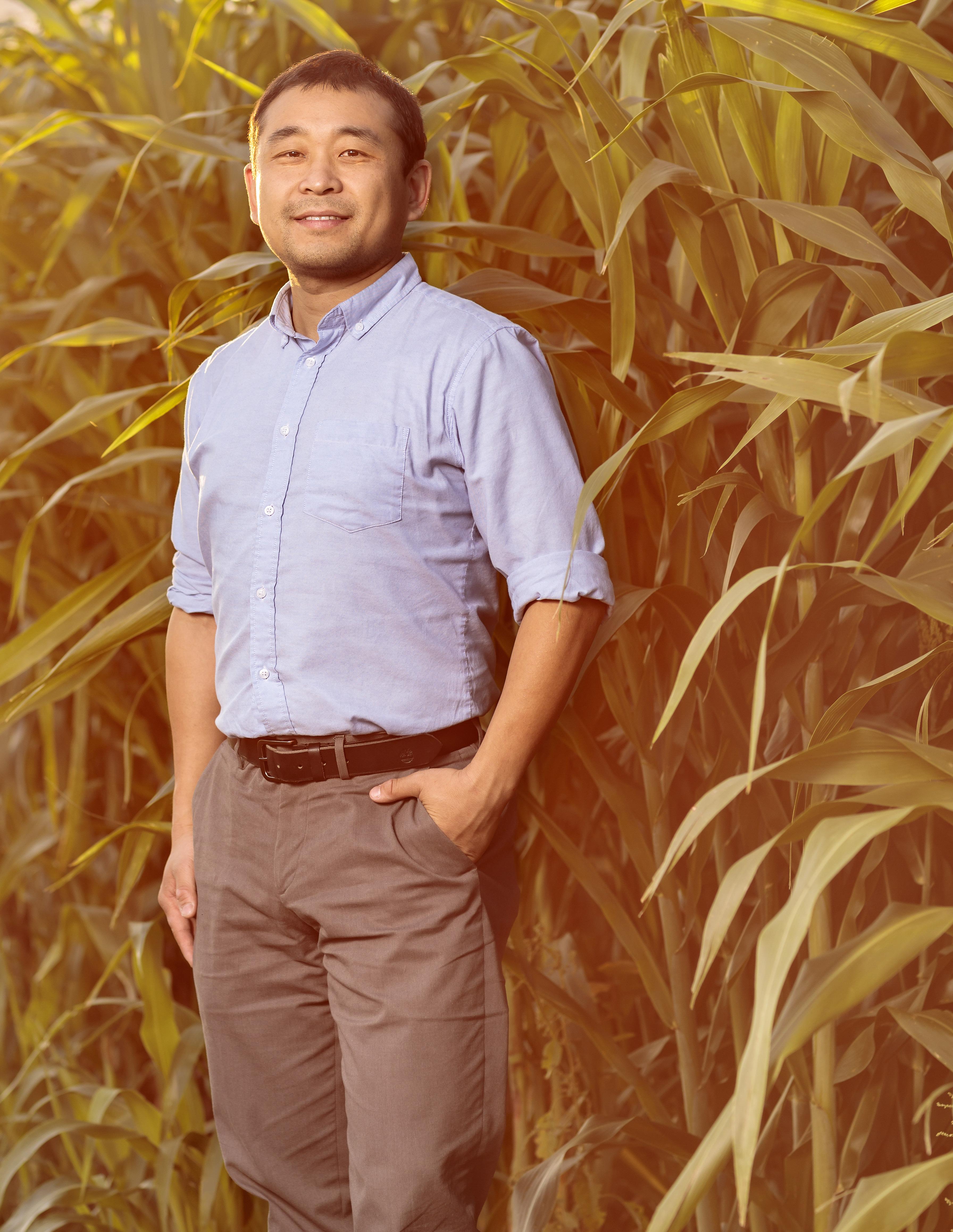
“ We’re proud to help lead a future where sustainability and economic prosperity go hand in hand.”
Backed by a $10 million gift, the Levenick Center unites science, sustainability, and societal good advancing ACES’ land-grant mission to improve lives and the planet.
With the launch of the Levenick Center for a Climate-Smart Circular Bioeconomy, the University of Illinois UrbanaChampaign takes a bold step forward in addressing the global climate crisis.
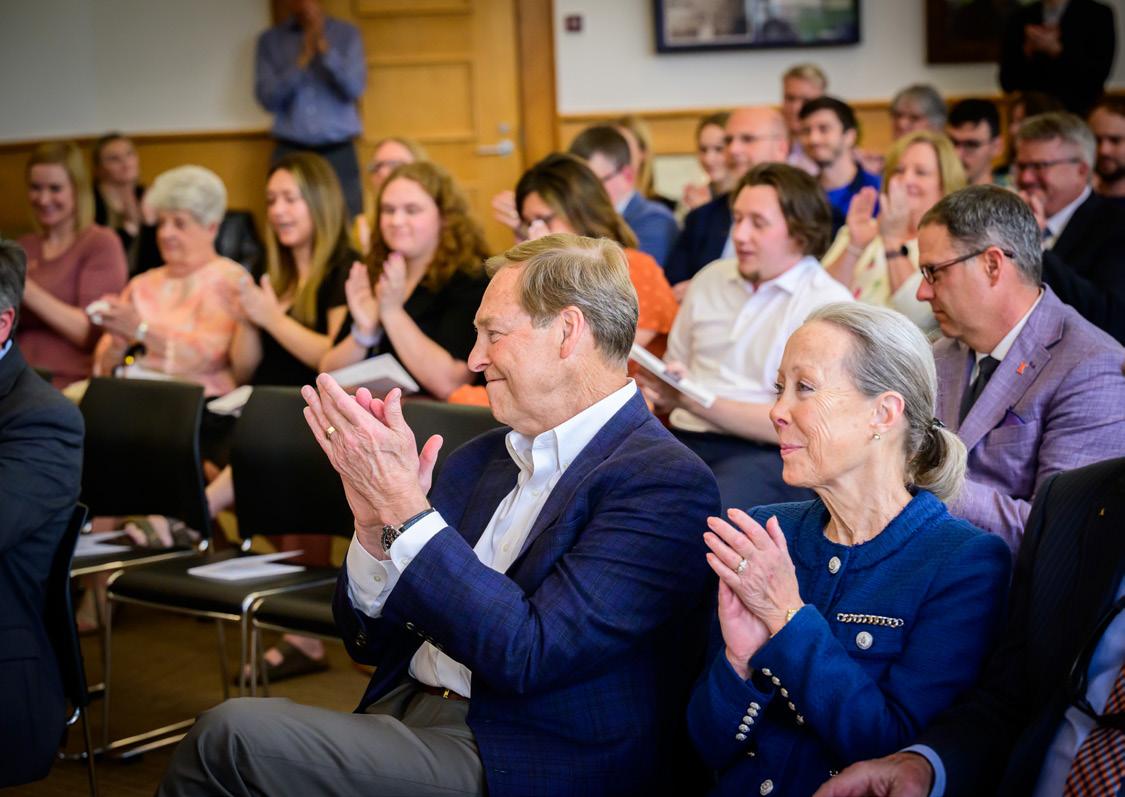
Fueled by a visionary $10 million gift from Stuart L. and Nancy J. Levenick, the Center is housed within the Institute for Sustainability, Energy, and Environment (iSEE), becoming the first named center of its kind in the U.S.
The Levenick Center is more than a timely initiative it is a natural fit for Illinois, a global leader in agriculture, engineering, and climate science. As a land-grant institution, the U. of I. has long been committed to applying research and innovation to real-world challenges. The Levenick Center exemplifies this mission by promoting a regenerative, circular economy that minimizes waste, reduces fossil fuel dependence, and strengthens food systems.
The College of ACES will be a cornerstone of this work. With a proven track record in agricultural innovation and sustainability leadership, ACES will play a critical role in shaping the Center’s interdisciplinary approach. Kaiyu Guan, an internationally recognized climate and ecosystem scientist, has been named the first Levenick Professor of Sustainability bringing transformative expertise to this new endeavor.
From collaborative research to hands-on programming, the Levenick Center advances sustainability through initiatives like the Corporate Sustainability in Practice Program, designed to empower leaders with climate-smart strategies. By bridging science, business, and policy, the center aims to decarbonize industries and build systems that sustain both the planet and its people.
“This center exemplifies the land-grant promise science in service to society,” said ACES Dean Germán Bollero. “We’re proud to help lead a future where sustainability and economic prosperity go hand in hand.”
To support the Levenick Center for a ClimateSmart Circular Bioeconomy and its mission to advance sustainable solutions through research, education, and outreach, visit go.aces.illinois. edu/give. Select “Other” as the gift designation, and enter “Levenick Center – 342989.”
From wearable glucose monitors to DNAbased diet plans, personalized nutrition is transforming how we think about food and health.
At the forefront of this revolution is the Personalized Nutrition Initiative, spearheaded by food science and human nutrition professor Sharon Donovan. PNI unites experts from across disciplines to examine how nutrition shapes health and to guide the public through an increasingly complex maze of options, apps, and algorithms.

“One of the biggest challenges is that to do personalized nutrition right, you need a lot of different types of data, and the field is becoming increasingly complex,” Donovan said. “To provide consistency and continuity, we need to understand all these components and how they fit together. There are also ethical considerations about data sharing.”
PNI is a university-wide initiative based in the Office of the Vice Chancellor for Research and Innovation, in partnership with the College of ACES and the Carl R. Woese Institute for Genomic Biology. Donovan and her colleagues recently convened two high-level workshops, bringing researchers and practitioners together to explore everything from AIdriven diet analysis to ethical standards for data sharing.
With so many consumer products now offering everything from microbiome insights to genetic risk reports often
without clinical guidance PNI is also focused on education. The initiative offers two online courses through Coursera. Meanwhile, FSHN and the Division of Nutritional Sciences offer a graduate certificate for professionals interested in food regulation and nutrition policy.
ACES researchers also provide nutrition advice through the Individualized Diet Improvement Program, which uses data visualization tools and intensive dietary education sessions to increase dieters’ knowledge of key nutrients, enabling them to create a personalized, safe, and effective weight-loss plan.
FSHN professor Manabu Nakamura leads the project, which focuses on increasing protein and fiber consumption along with consuming 1,500 calories or less daily. Nakamura’s team has developed an online app where participants can design individualized meals for weight loss and monitor their progress.
A study of iDip participants found that after one year, successful dieters (41% of participants) had lost 12.9% of their body weight.
In another study with rural Illinois residents recruited through Illinois Extension participants lost an average of 5 kilograms over 12 months, while enjoying the flexibility and feedback offered by the program.
Want to try it for yourself? Meal Plot, the mobile app component of the EMPOWER weight loss program, is free and available to the public. Sign up at mealplot.com
“People can experiment and learn on their own and get immediate feedback to encourage behavioral changes in diet and lifestyle. Hopefully, over time they will not need to rely on this feature but intuitively understand what foods to eat,” said Asleigh Oliviera, a doctoral student in DNS, who works with Nakamura on the project.
The STRONG Kids Program, a transdisciplinary project led by ACES, studies how biology interacts with family dynamics to shape children’s eating habits. Now in its second wave, the study is tracking 451 Illinois families over a decade, collecting biological data and surveying caregivers about diet, routines, emotions, and parenting styles.
This rich dataset is yielding powerful insights. For instance, research by Samantha Iwinski, a postdoctoral associate in human development and family studies, revealed how maternal postpartum depression can impact children’s
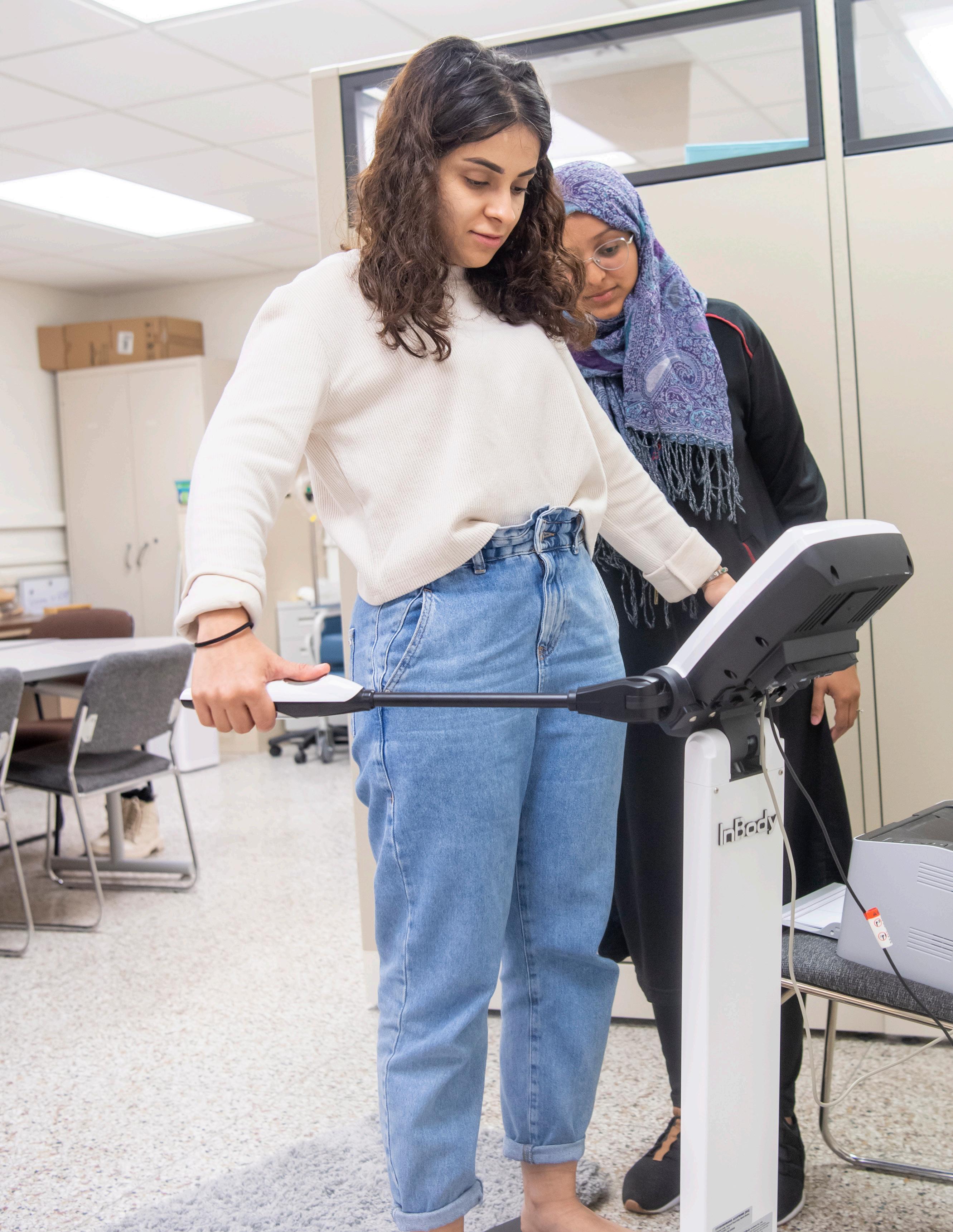
executive function leading to behaviors like emotional overeating.
“Our findings underscore how crucial early support for mothers is not just for their own wellbeing but for their children’s long-term health,” Iwinski said.
Together, these efforts reflect ACES’ deep commitment to translating research into meaningful, measurable change— for individuals, families, and communities.
The first industrial revolution was powered by coal. The next one will be powered by corn.
Biomanufacturing is using fermentation and agricultural feedstocks to produce everything from plastics to fertilizers and Illinois is leading the way.
The Illinois Fermentation and Agriculture Biomanufacturing Tech Hub is poised to transform the Midwest into the global center of sustainable manufacturing. Backed by a $51 million federal grant and more than $680 million in public and private partner commitments, iFAB represents a once-in-a-generation opportunity to create an industry from the ground up.
The iFAB Tech Hub is anchored in the College of ACES through the Department of Agricultural and Biological Engineering, home to the Integrated Bioprocessing Research Laboratory, which leads the initiative. The Department of Food Science and Human Nutrition’s Pilot Processing Plant also plays a key role, supporting product and process development across the bioeconomy.

The U.S. bioeconomy is projected to grow into a $30 trillion global market over the next two decades. Here in the U.S., scaling up biomanufacturing could generate over 1 million new jobs by 2030, many of them in regions historically left behind by tech booms. Illinois is uniquely positioned to lead that transformation.

“With deep roots in agricultural production, cutting-edge R&D capacity, and a statewide infrastructure network, Illinois offers everything this new industry needs to thrive. From fermentation tanks to farm fields to freight rail, the iFAB Tech Hub capitalizes on the state’s unmatched assets to bring sustainable manufacturing from concept to market,” said the iFAB Tech Hub’s Regional Innovation Officer Beth Conerty, who is based out of the Integrated Bioprocessing Research Laboratory in the Department of Agricultural and Biological Engineering.
The corporate sector is already seeing the value of the iFAB Tech Hub. “We’re proud to be part of this visionary effort to establish Central Illinois as the epicenter of biomanufacturing,” said José Leboreiro, vice president of carbohydrate solutions R&D at ADM, one of iFAB’s founding partners. “iFAB helps connect the dots from lab bench to manufacturing line by bringing together the infrastructure, expertise, and partnerships needed to scale ideas into impact. It’s a powerful example of what’s possible when industry and public research align.”
For Illinois farmers, iFAB also represents a major opportunity. As biomanufacturing expands, it will require a steady, large-scale supply of raw materials, particularly corn and soybeans.
“That demand translates into new, reliable markets for U.S. farmers, helping to offer price stability at a time when global trade dynamics remain uncertain and evolving,” said James Glueck, senior vice president of advanced bioproducts at the Corn Refiners Association. “We’re proud to support the iFAB Tech Hub’s work to ensure domestically-grown crops are the heart of next-generation U.S. biomanufacturing.”
If successful, iFAB won’t just produce the materials of tomorrow it will redefine where and how they’re made.

Explore iFAB’s work and discover how you or your organization can get involved at ifabtechhub.org Learn more about IBRL at ibrl.aces.illinois.edu and the Pilot Plant at pilotplant.aces. illinois.edu. Check out custom short course offerings: ibrl.aces.illinois.edu/custom-courses.
ACES alum channels training into child protection and invites students to follow his lead.
Jonathan Munoz credits his human development and family studies education with preparing him for the challenges of helping children in difficult situations.
Munoz is the executive director of the Vermillion County Child Advocacy Center in Danville. He began working at the center as a child and family advocate after graduating from HDFS in 2021 and was promoted to his current position in 2023.
VCCAC is a non-profit organization that assists the Illinois Department of Children and Family Services and local law enforcement when child abuse is suspected.
“Going to the police station or DCFS offices can be very traumatic for children who have suffered abuse. We work as a multidisciplinary team to provide the children with a friendlier environment where they can tell us what happened to them. We also coordinate services with local crisis centers and mental health professionals,” Munoz said.
Munoz began his studies at Illinois as an undeclared major. But then he took some classes with HDFS professors and fell in love with the program.
“Learning about the dynamics of families and different cultural, religious, and ethnic perspectives has been very beneficial for my work at the center. It has prepared me well to have difficult conversations when we evaluate what happened to a child,” he said.
After graduation, Munoz had job offers from employers around the country, but he welcomed the opportunity to make a difference in his local community. He grew up in Central Illinois and wanted to settle close to home with his wife and their two young children.
Munoz is excited to share his expertise with current HDFS students, as VCCAC will take on two interns in the fall semester.
“I think it will be helpful for them to see the different dynamics of law enforcement and DCFS in case they want to go into this field. They’ll get a sense of what they can expect, and they’ll get an opportunity to learn about child advocacy centers,” he said.
To support experiential learning opportunities that prepare ACES students for impactful careers, visit go.aces.illinois.edu/give, select “Other” as the gift designation, and enter “ACES Leadership Academy Fund – 341594.” Your gift helps students gain realworld experience and make a difference in their communities.



When Alyssa Deolitsis launched Deolicious Cookies in 2022, she didn’t just build a custom cookie business she baked her way back to where it all began.
A graduate of the hospitality management program in the Department of Food Science and Human Nutrition, Alyssa credits her sweet success to the food science know-how and Illini friendships that helped her rise.
“A huge reason my business grew so fast is because of friends I met at the University of Illinois,” she said.
Thanks to her ACES background, Alyssa brings serious skills to every batch from budgeting and baking science to food safety and small-business smarts.
What started as a passion project has turned into a fullblown bakery brand, with themed cookie sets for baby showers, birthdays, and bridal events and hundreds of cookies going out each week to venues like the Aragon Ballroom, Northerly Island, and yes, even back to campus for Reading Day.
The ACES experience doesn’t end at graduation. Whether you’re five miles or five time zones away, there are meaningful ways to stay involved and inspire the next generation.
Here are just a few ways to stay engaged:
• Be a part of our ACES community join us for events, follow ACES on social media, update your contact info, and subscribe to our newsletters to hear what’s new and what’s next.
• Share your story through guest lectures, class visits, or alumni panels your journey can spark new ideas and confidence in future leaders.
• Support students as they explore career paths, navigate college, or take their first professional steps. Open doors by offering internships, job shadowing, or connections in your field.
Contact us at acesalumni@illinois.edu to explore these opportunities to get more involved today.
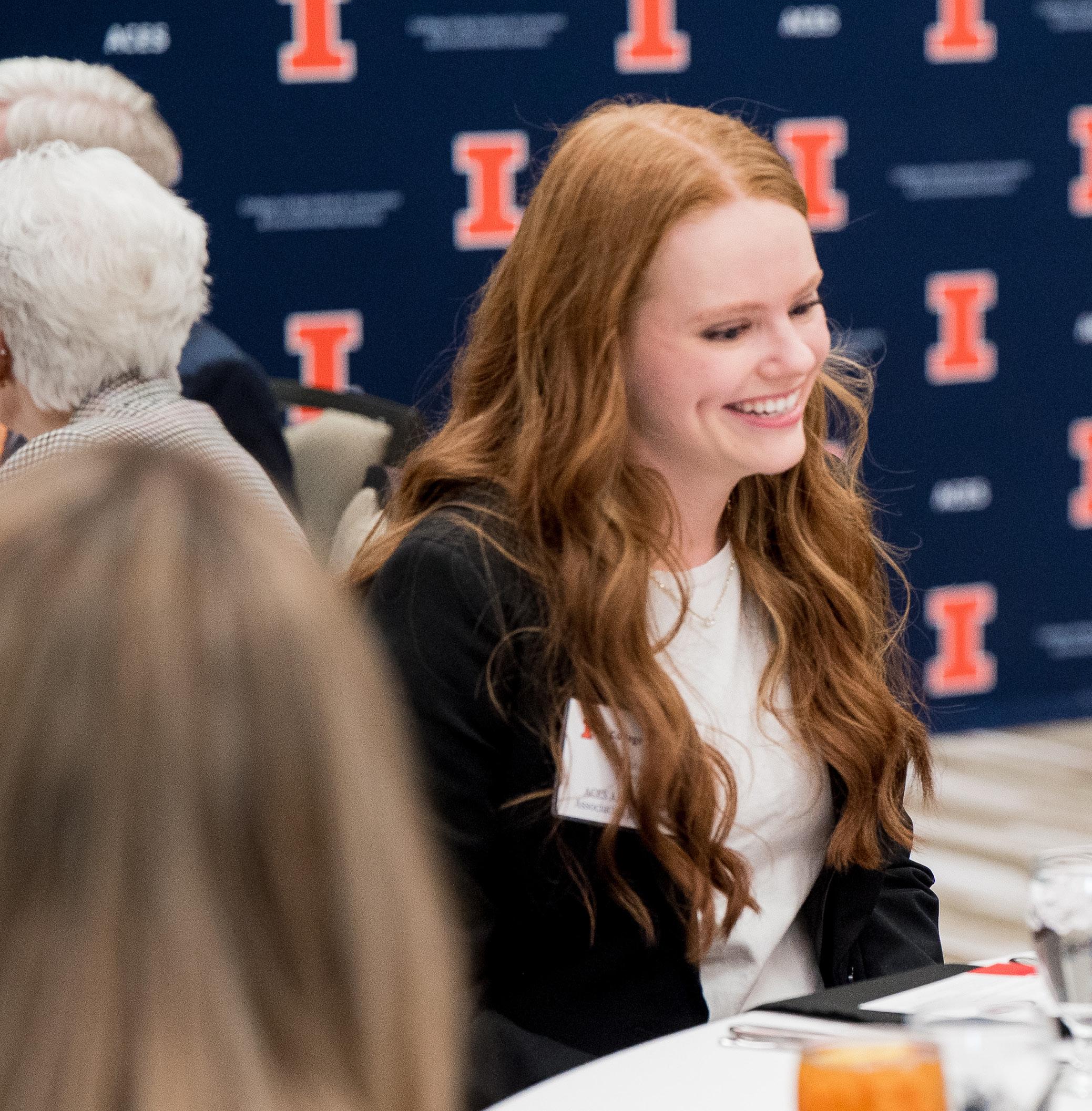
Alumni-backed JBT scholarships help ACES students grow as leaders and changemakers.
Since 2016, the College of ACES Alumni Board has been a strong supporter of the Jonathan Baldwin Turner Scholar program. What started as a shared scholarship fund among board members has become an annual tradition, with current and former members coming together to support outstanding students in ACES.
This year, the board’s collective effort supported two scholars: Allanah Martin and Cora Dittmar. Allanah, a senior in nutrition and health, said, “JBT has provided me with a community within the College of ACES that has challenged me to think outside of the box.”
Cora, a sophomore studying agricultural leadership, education, and communications, added, “The JBT program has greatly impacted me, helping with the financial burdens
of college and giving me access to opportunities for professional development. I have also enjoyed the support of my cohort, where I have made lifelong friends that I wouldn’t have without JBT.”
Together, they’re proof that when alumni rally around students, the results ripple far beyond a single scholarship.
Named after Illinois land-grant pioneer Jonathan Baldwin Turner, the JBT scholarship program recognizes highachieving students who show exceptional promise as leaders and changemakers.
JBT Scholars are selected not just for academic excellence, but for their curiosity, service, and leadership qualities that mirror the College of ACES’ mission to improve lives and communities through innovation and hands-on learning.
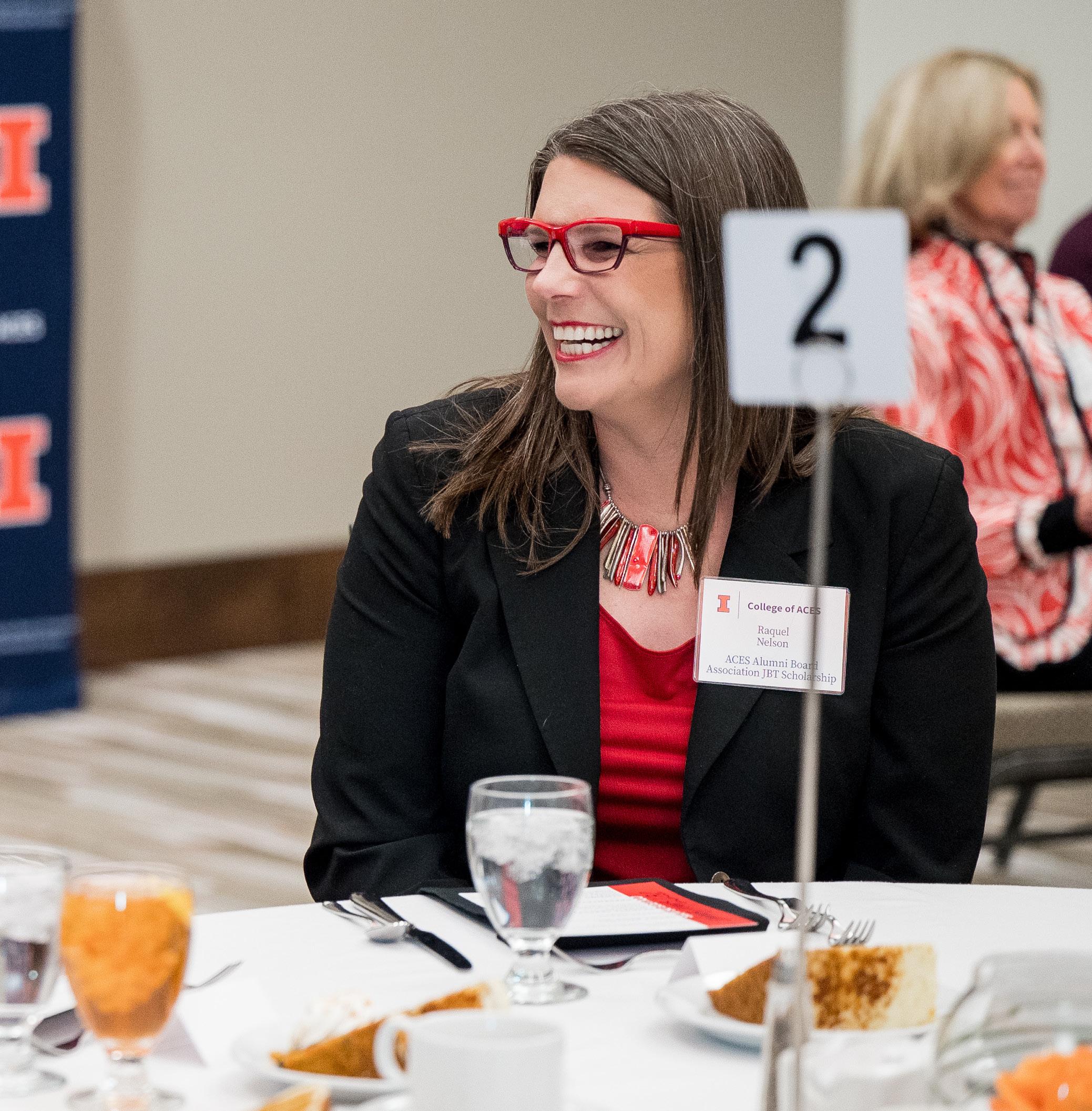
• 30+ students awarded JBT scholarships each year.
• 3.9 is the average GPA of incoming JBT Scholars.
• 100% participate in leadership, service, or research opportunities.
• 2000+ alumni have benefited from the JBT program since its founding.
Scholarships play a vital role in student success, opening doors to transformative experiences and reducing financial barriers to education.
To learn how you can empower the next generation of ACES leaders through a named JBT Scholarship, contact the ACES Office of Advancement at 217-3339355 or acesadvancement@illinois.edu.
The James F. Evans Global Center for Food and Agricultural Communications is more than a tribute it’s a call to action.
Named for longtime professor and visionary Jim Evans, the center aims to train the next generation of communicators who can lead in a global food system.
Housed in the College of ACES, the Evans Center will advance applied research, immersive learning, and international collaboration.
In May 2025, the Evans Center announced plans to launch its first academic offering: a certificate in global agricultural communications. Developed in partnership with the International Federation of Agricultural Journalists, the online program will equip professionals with skills in multimedia storytelling, data journalism, ethical reporting, and cross-cultural leadership preparing them to inform and connect an increasingly complex food system.
“This certificate represents an exciting step forward for the global agricultural journalism community,” said IFAJ Vice
President Adalberto Rossi. “By equipping professionals with critical thinking, multimedia skills, and a global perspective, we can raise the bar for agricultural communications worldwide.”
The certificate is a direct result of listening to industry needs through surveys of IFAJ’s 6,600 members across 62 countries, and it underscores ACES’ role in shaping the future of agricultural communications.
We’re building momentum but we need your help to finish what we started. Your support ensures that future leaders have the tools to inform, engage, and connect across borders and the urban/rural divide.
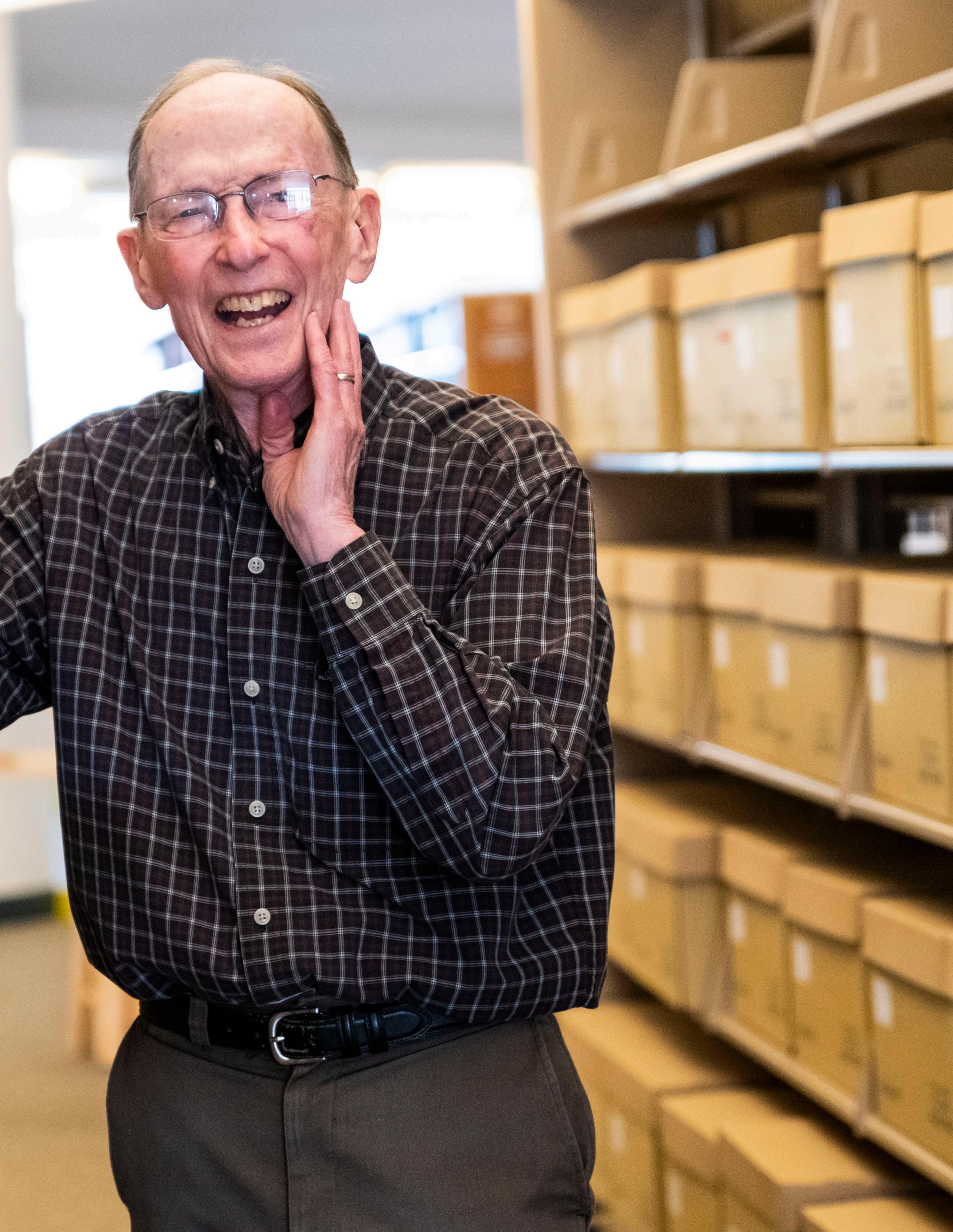
Learn more about supporting these efforts at go.aces.illinois.edu/EvansCenter or contact the Office of Advancement at 217-333-9355 or acesadvancement@illinois.edu.
IIllinois Extension is advancing a bold strategic vision Lifelong Learning. Lifelong Impact. just as a landmark new facility brings that mission into sharper focus.
For generations, Extension has connected the university with communities statewide, delivering trusted research and hands-on education in areas like food systems, family nutrition, environmental resilience, and youth development.
But with 775 staff across 102 counties and campus teams scattered across buildings Extension hasn’t had a central administrative hub.
That changes soon thanks to the generosity of Pampered Chef founder and College of ACES alum Doris Kelley Christopher who has helped establish the new Doris Kelley Christopher Illinois Extension Center.
The new building, located in the university’s Arboretum, will serve as a visible symbol of Extension’s essential outreach
role, provide a gateway for relationship building across the academy and throughout the state, and endure as a physical representation of the vital impact of Illinois Extension’s mission.
The sustainably minded structure will feature meeting and collaboration rooms, office spaces, and unique signature spaces including a discovery kitchen, maker lab, and media studio.
The Doris Kelley Christopher Illinois Extension Center is an important step toward a more unified, innovative, and impactful future for Illinois Extension. As we break down physical and disciplinary barriers, this center will empower Extension staff and faculty to co-create solutions with communities across the state.
To support this visionary facility and explore naming opportunities, visit go.aces.illinois.edu/give Select “Other” as the gift designation, and enter “Doris Kelley Christopher Illinois Extension Center – 336543.” For more information, contact the Office of Advancement at 217-333-9355 or acesadvancement@illinois.edu.
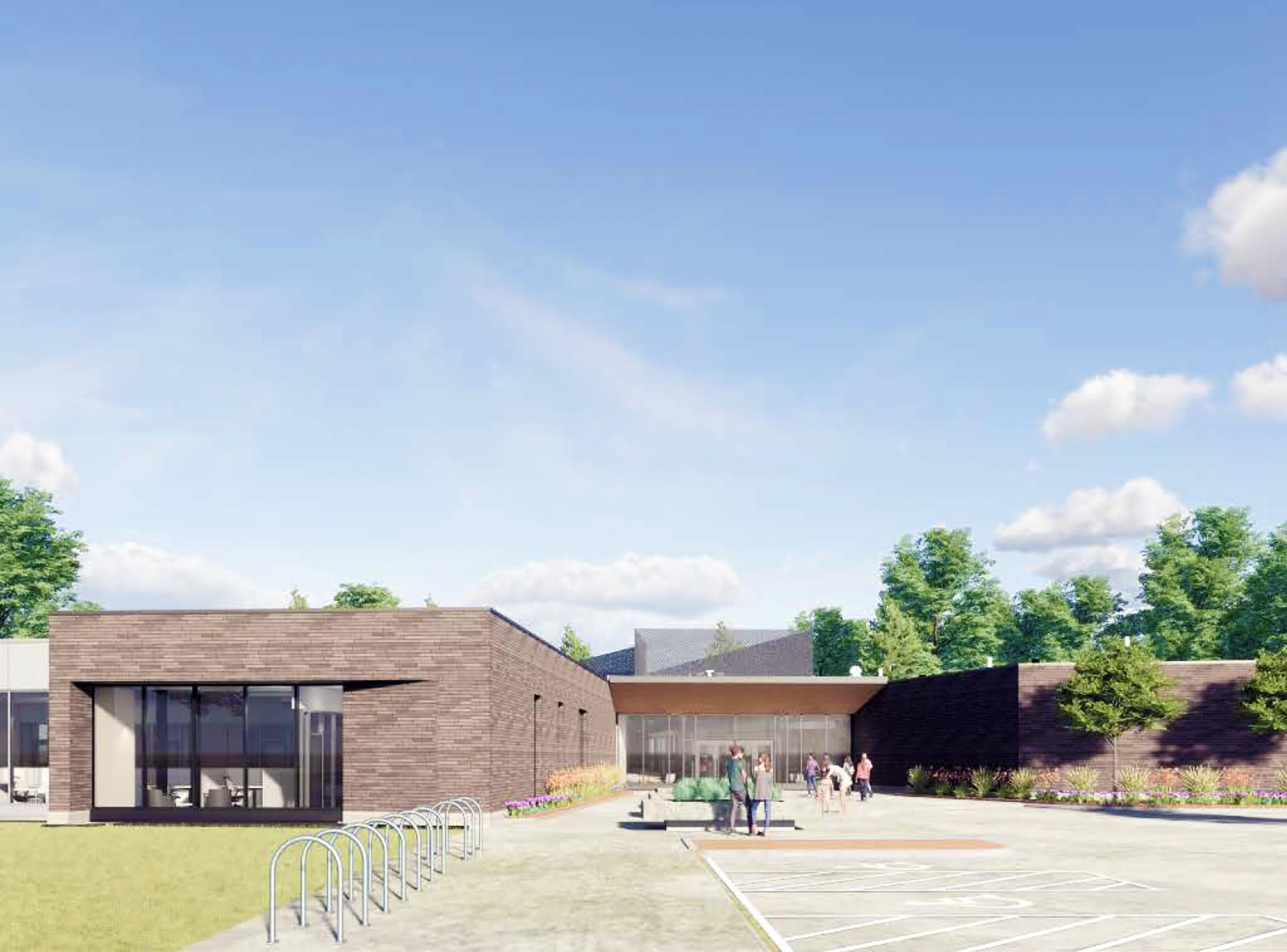
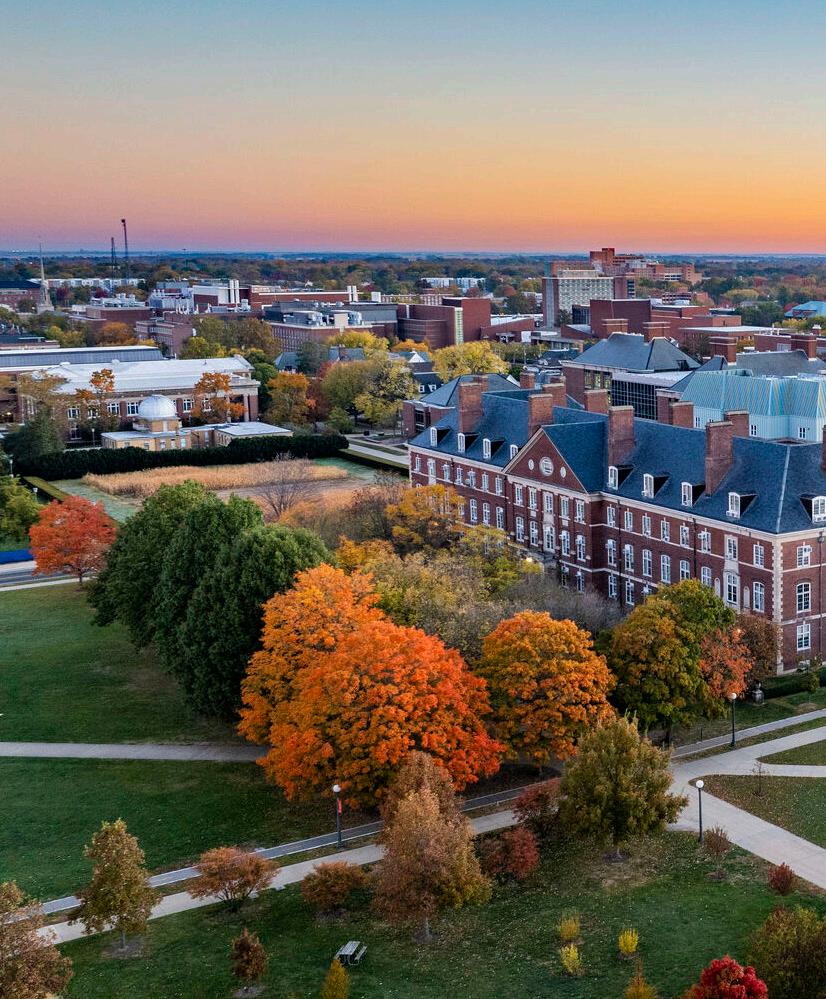
The future won’t wait — and neither will we.
The College of ACES was built on a bold idea: that science and education, rooted in the needs of the people, could change the world. For more than 150 years, that landgrant vision has come to life in our classrooms and fields, laboratories and communities and in the lives of those we serve.
But the world is changing fast. The challenges facing society today from climate volatility and food insecurity to workforce shifts and health disparities demand bold, interdisciplinary solutions. The next 150 years will require ACES to think differently, teach differently, and engage differently. And that starts with the spaces we create.
Through three transformative projects the revitalization of Mumford Hall, the expansion and unification of the Child Development Laboratory, and the launch of the ACES Learning Innovation Laboratory we’re building the infrastructure to match our ambitions.
For generations, Mumford Hall has stood as the symbolic and operational heart of ACES. Inside its red brick walls, policy has been shaped, partnerships formed, and students prepared to lead across agriculture, economics, and beyond.
But time has taken its toll. What was once the flagship is now a bottleneck outdated, compartmentalized, and unable

to meet the needs of a college built for collaboration. The plans for Mumford Hall don’t just preserve its legacy; they reimagine its purpose.
By opening up the first floor to collaborative gathering spaces, modernizing classrooms and advising suites, and enhancing accessibility and energy efficiency, we’re creating a hub where every student no matter their major feels welcomed, supported, and inspired to pursue their goals.
The revitalized Mumford Hall will embody our One College vision: uniting disciplines, people, and ideas under one roof.
The Child Development Laboratory is one of ACES’ most beloved and unique spaces a place where children learn, families are supported, and scientific research into human development unfolds in real time. For students across education, psychology, speech and hearing science, art, and nutrition, the CDL offers rare access to hands-on learning that shapes careers and improves lives. Now, we’re taking that model to the next level.
Plans are underway to unite the CDL’s operations into a single, expanded facility, one that reflects the scale and excellence of its mission. This new space will allow us to

serve more families, enhance interdisciplinary research, and provide unmatched training opportunities to prepare the next generation of educators and professionals.
At a time when early childhood care, family well-being, and developmental health are at the forefront of public conversation, ACES is leading with science, equity, and a deep belief in the power of education.
The ways people learn, and the tools they need to thrive, are changing fast. To keep pace, ACES is creating a new space purpose-built for accessible, high-impact education: the ACES Learning Innovation Laboratory.
Located in the lower level of the ACES Library, this techforward renovation will house collaborative classrooms, a multimedia recording studio, and shared workspace for developing online and hybrid courses. It will serve faculty, students, Extension educators, and industry partners anyone who wants to reimagine how knowledge is shared and applied.
By expanding our capacity to deliver dynamic, stackable learning experiences, the lab will help ACES meet learners where they are and help them achieve their dreams.
These projects are arriving at a pivotal moment in our history. As peer institutions race to modernize, ACES is uniquely positioned to lead, but we must move together and with urgency. Each of these investments represents a piece of a larger vision: preparing the College of ACES to serve Illinois and the world for the next 150 years.
We invite you to be part of that future one defined not by what we’ve inherited, but by what we’re building.
The time to act is now and the place to lead is here. To support ACES’ land-grant mission, give online at go.aces.illinois.edu/give or contact the Office of Advancement at 217-333-9355 or acesadvancement@illinois.edu.
642 FRESHMEN + 170 TRANSFER STUDENTS August 2024
40,821 LIVING ALUMNI
10 DEPARTMENTS & PROGRAMS
18 Undergrad Majors 27 Master’s Degrees
$82.4M RESEARCH FUNDING
25 ONLINE GRADUATE & UNDERGRAD CERTIFICATES
52
7 ONLINE MASTER’S DEGREES NON-CREDIT CERTIFICATES & SPECIALIZATIONS
3,668 TOTAL STUDENTS
2,900 Undergrad Students 768 Grad Students
187 Tenured Faculty
1,796 TOTAL EMPLOYEES
1,654 Staff Full-Time
$6.4M TOTAL CORPORATE GIVING $4.5M IN ACES SCHOLARSHIPS AWARDED IN FY25 $21.3M AMOUNT DONATED
805K+ PROGRAM ATTENDEES
1,840 4-H CLUBS
20,339 Members
12,484 LOCAL GOVERNMENT EDUCATION WEBINAR REACH
67,917 FAIR EXHIBITS
261,012 4-H Experiences
730 COMMUNITIES SERVED
90 ONLINE COURSES ACCESSED BY 12K+ PEOPLE
547 EDUCATIONAL SESSIONS/WK
5,563 PROGRAM VOLUNTEERS
266 COMMUNITY GARDENS
2,922 SCHOOL & COMMUNITY PARTNERS
$4.7M+ FUNDS SECURED FOR SNAP-ED PARTNERS $15.7M+ VOLUNTEER CONTRIBUTIONS
$514,316 VALUE OF DONATED PRODUCE
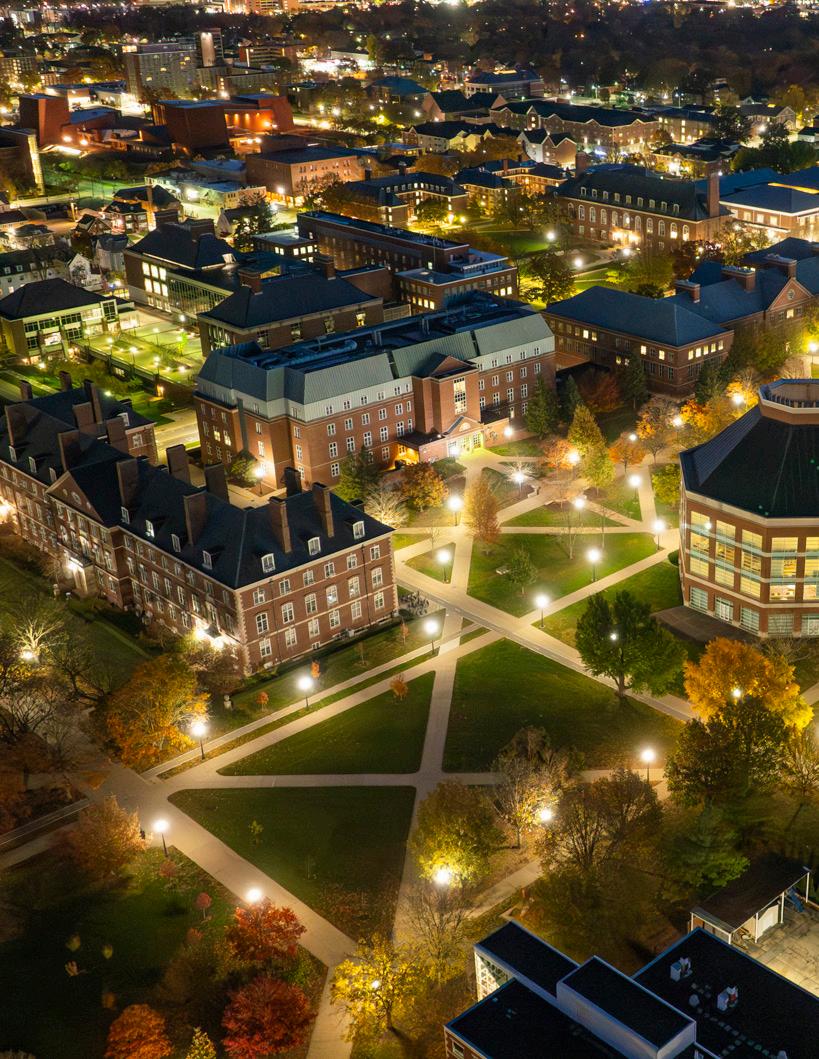
As a land-grant institution, the College of ACES is committed to sharing knowledge, advancing discovery, and improving lives in every corner of Illinois and beyond. You are part of that mission.
• Stay informed. Sign up for The Advance, our external newsletter, for the latest on how ACES research, teaching, and outreach are making a difference at go.aces.illinois.edu/TheAdvance.
• Join the conversation. Follow us on social media and celebrate stories of impact, innovation, and community at go.aces.illinois. edu/Connect.
• Invest in impact. To support ACES’ land-grant mission and help us build stronger communities, contact the Office of Advancement at 217-333-9355 or acesadvancement@illinois.edu.
Editor-in-Chief
Claire Benjamin
Editors
Leslie Ehler
Marianne Figge Stein
Lauren Quinn
Design
Megan Elkins
Production
Meghan Matlock
Gabri Moore
Paige Potter
Taylor Roberts
Printing
Martin One Source
Contributors
Jennifer Abbott
Jim Baltz
Kylie Corral
Sydney Friedman
Jean Lachat Photography
Matthew Lester Photography
Bridget Lee-Calfas
Katie Knapp
Maci Kingren
Anna Longworth Photography
Leslie Myrick
Carissa Nelson
Vidhi Patel
Ava Splear
Fred Zwicky
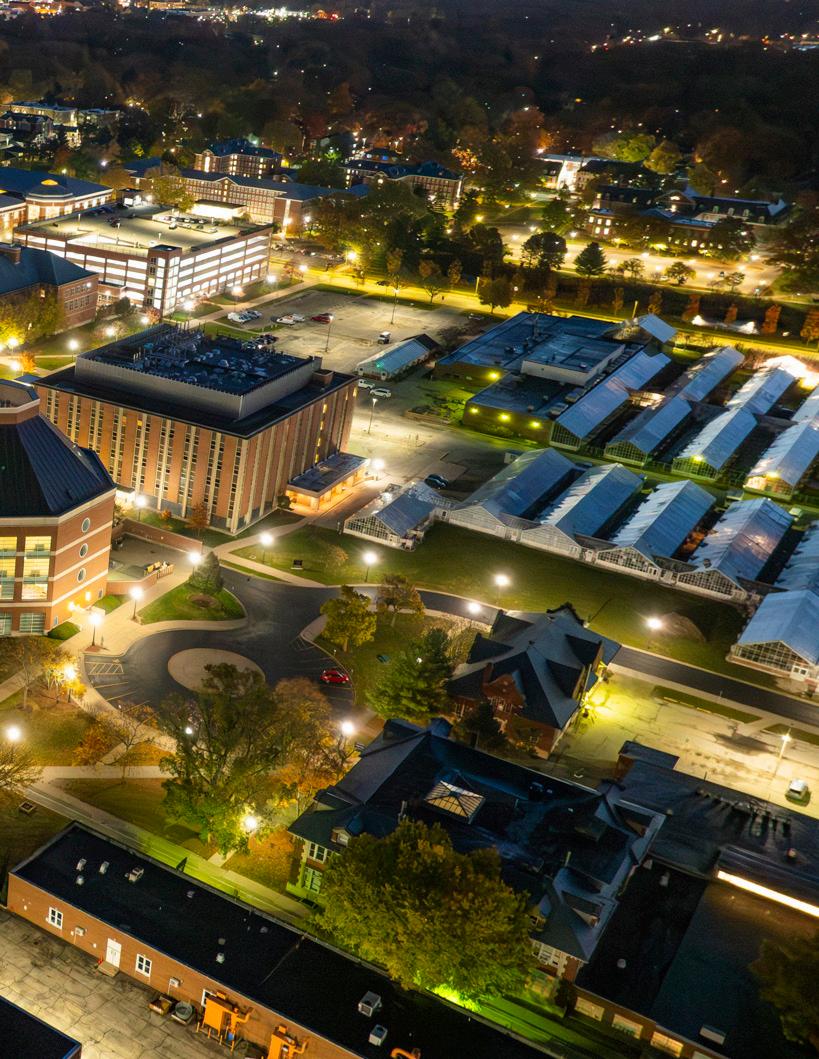
Germán Bollero Professor and Dean, Robert A. Easter Chair
Julia Abel Director of Strategy, Planning and Implementation
Mary Arends-Kuenning Associate Dean of International Programs
Anna Ball
Associate Dean of Academic Programs; Director of Agricultural Leadership, Education, and Communications
Joe Bohn Executive Director of Human Resources
Adam Davis
Department Head of Crop Sciences
Nicki Engeseth
Department Head of Food Science and Human Nutrition
Nichole Isaac Assistant Dean for Business and Administration
Rod Johnson
Associate Dean of Research, Director of the Illinois Agricultural Experiment Station
Durriyyah Kemp
Interim Associate Dean and Director of University of Illinois Extension and Outreach
James Kim Director of Information Technology
Sarah Low Department Head of Agricultural and Consumer Economics
Ronaldo Maghirang
Department Head of Agricultural and Biological Engineering
Elizabeth Olson
Associate Dean of Diversity, Equity, and Inclusion
Ramona Oswald
Department Head of Human Development and Family Studies
Robert Schooley
Department Head of Natural Resources and Environmental Sciences
Daniel Shike
Interim Department Head of Animal Sciences
Kelly Swanson Director of the Division of Nutritional Sciences
Stephen Wald Director of External Communications and Government Relations; Interim Assistant Dean of Marketing Communications
Maggie Wave Assistant Dean of Advancement
